#the dueling grounds (discourse)
Explore tagged Tumblr posts
Note
ok uhhh dr ratio with an s/o who is just as intelligent as he is
so when they have their first kiss, the reader gets so nervous that they start mumbling random facts about ancient egypt / etc. :3
Facts Between the Kisses
Summary: In the grand library of the Intelligentsia Guild, Ratio shares a rare moment of vulnerability with you, his equally brilliant partner. After hours of intense discussion, a surprising first kiss leaves you so flustered that you begin rambling about ancient Egyptian medical practices.
Tags: Ratio x Reader, Fluff, Romantic Comedy, Kiss, Nervous Reader, Banter.

The Intelligentsia Guild's library was vast, a labyrinth of shelves and tomes brimming with knowledge. Ratio sat at one of its ornate desks, the golden owl ornament on his shoulder glinting in the low lamplight. His eyes, framed by his wavy hair, scanned the pages of an ancient manuscript. A faint smirk curled his lips as he heard the approaching footsteps—light, deliberate, and unmistakable.
“Late for our discussion on temporal mechanics, are we?” he said without looking up.
You grinned, stepping into view with a stack of books tucked under your arm. “Only because I was busy proving your theorem on recursive algorithms incomplete. Again.”
Ratio’s smirk deepened. “I expected no less from you. Care to enlighten me?”
You set your books down with a soft thud and leaned forward, gesturing at one of the diagrams in his manuscript. The two of you dove into an intense debate, trading ideas and insights like dueling swords. Your conversations were always this way: sharp, challenging, and utterly exhilarating.
After hours of discourse, the library grew quieter. The steady hum of your voices faded into a companionable silence as you both sat back, basking in the afterglow of shared brilliance.
Ratio’s gaze lingered on you, his expression uncharacteristically soft. “You know, it’s rare to find someone who can keep pace with me,” he said. His tone was casual, but there was an undercurrent of sincerity that made your heart skip a beat.
You laughed nervously, feeling the heat rise to your cheeks. “Well, someone has to keep you grounded. Otherwise, your ego might collapse into a singularity.”
He chuckled, a low, melodious sound that sent a shiver down your spine. “Perhaps. But you’re not just an equal—you’re… more.”
The words hung in the air, heavy with unspoken emotion. Before you could respond, Ratio leaned closer, his striking eyes locking onto yours. His confidence was palpable, but there was a hint of hesitation, as if he was stepping into uncharted territory.
“May I?” he murmured, his voice softer than you’d ever heard it.
You nodded, your breath hitching as he closed the distance. His lips brushed against yours, gentle at first, then firmer as the moment deepened. The world seemed to fade away, leaving only the two of you in that perfect, fleeting instant.
When you pulled back, your heart was racing, your thoughts a jumbled mess. Instead of saying something romantic or profound, your nerves got the better of you.
“Did you know the ancient Egyptians used honey as an antibacterial ointment?” you blurted out.
Ratio blinked, clearly caught off guard. You clapped a hand over your mouth, mortified, but the corners of his lips twitched into a grin.
“Fascinating,” he said, his tone teasing. “I assume this is your way of processing… overwhelming stimuli?”
You groaned, burying your face in your hands. “I can’t believe I just said that.”
He gently pried your hands away, his smile warm and uncharacteristically tender. “Don’t be embarrassed. It’s endearing.”
You gave him a skeptical look, but his gaze was so earnest that you couldn’t help but relax.
“Besides,” he continued, leaning back with a smug expression, “it’s fitting that our first kiss would be followed by a discussion on ancient medical practices. I wouldn’t expect anything less… unique from you.”
You rolled your eyes, but a smile tugged at your lips. “You’re insufferable.”
“And yet, you adore me.” He reached for your hand, his touch sending a thrill through you. “Shall we continue our discussion? Perhaps this time, you can focus on me instead of ancient Egypt.”
Despite your embarrassment, you found yourself laughing. “Deal. But only if you can keep up.”
Ratio’s eyes sparkled with amusement. “Oh, my dear, I always do.”

#x reader#honkai star rail#hsr#honkai star rail x reader#hsr x reader#ratio x reader#cotl ratoo#veritas#veritas ratio#hsr veritas#veritas x reader#fluff#romantic comedy#kiss#nervous reader#banter
162 notes
·
View notes
Text
If the response to fascist bullying isn't to punch the Nazi, then it's the wrong response.
"Decorum" is not an effective strategy against an opponent that only understands fear and force. A really great story from Heather Cox Richardson.
...But today’s struggle within the Democratic Party shows a split between those who lead an opposition party devoted to keeping the government functioning, and a number of Democrats who are stepping into the position of leading the resistance to MAGA as it tries to destroy the American government. Praise for those resisters shows the popular demand for leaders who will stand up to Trump and Musk.
In a similar moment in 1856, newly elected representative from Massachusetts Anson Burlingame catapulted to popularity by standing up to the elite southern enslavers who had dominated the government for years.
Blustering, threatening, and manipulating the mechanics of the government, southern lawmakers had come to expect their northern political opponents, who valued civil discourse and compromise, to cave. Southern leaders threw their weight around to gather more and more power over the country into their hands. Finally, in 1854, they overreached, forcing through Congress the Kansas-Nebraska Act that permitted them to spread human enslavement into the American West. In the following elections, northerners sent to Congress a very different breed of representatives.
On May 22, 1856, pro-slavery representative Preston Brooks of South Carolina came up behind Massachusetts senator Charles Sumner and beat him nearly to death on the floor of the Senate after Sumner had given an antislavery speech Brooks found objectionable. But rather than pleading for calm and compromise in the wake of the attack, Burlingame had had enough. On June 21 he rose and gave a speech about his colleague and his state, calling it “Defence of Massachusetts.”
Burlingame stood up for his state, refuting the insults southerners had thrown at Massachusetts in recent speeches and insulting southerners in return. And Burlingame did something far more important. He called out the behavior of the southern leaders as they worked to attack the principles that supported “the very existence of the Government itself.”
“[T]he sons of Massachusetts are educated at the knees of their mothers, in the doctrines of peace and good will, and God knows, they desire to cultivate those feelings—feelings of social kindness, and public kindness,” Burlingame said. But he warned his southern colleagues that northerners were excellent soldiers and that “if we are pushed too long and too far,” northerners would fight to defend their lives, their principles, and their country.
Burlingame provoked Brooks, and he, temperamentally unable to resist any slight, challenged Burlingame to a duel. Brooks assumed all Yankees were cowards and figured that Burlingame would decline in embarrassment. But Burlingame accepted with enthusiasm, choosing rifles as the dueling weapons. Burlingame was an expert marksman.
Burlingame also chose to duel in Canada, giving Brooks the opportunity to back out on the grounds that he felt unsafe traveling through the North after his beating of Sumner made him a hated man. The negotiations for the duel went on for months, and the duel never took place. Burlingame had turned Brooks, known as “Bully” Brooks, into a figure of ridicule, revealing that when he faced an equal opponent, his bravado was bluster.
Forgotten now, Burlingame’s speech was once widely considered one of the most important speeches in American history. It marked the moment when northerners shocked southerners by standing up to them and vowing that the North would fight for democracy. Northerners rallied to Burlingame’s call and, in so doing, reshaped politics.
Make your voice heard. Our congresscritters need to hear "If you're not going to FIGHT for democracy then make room for someone who WILL."
#democracy#history#U.S. history#resist#if like mine your senator supported this limp dick move#call their ass and tell them they're on the block#find out who can replace them and SUPPORT that replacement#I am so ashamed of Dick Durbin#what a limp dick#get fucking primaried you old prune
26 notes
·
View notes
Text
Review of Blue Eye Samurai on Netflix
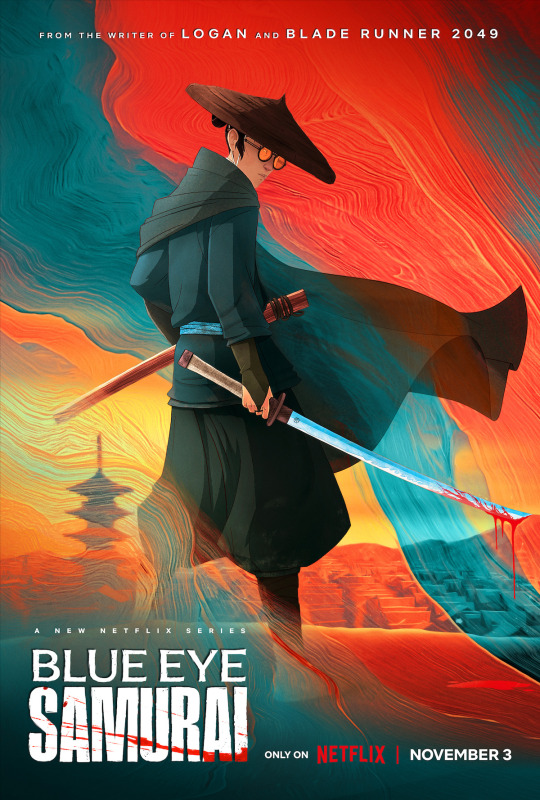
There are some spoiler-ish things below, but I think most of it is in the trailer, so I don't think I will ruin anything. I'll warn you during the most spoilery section, though the show makes the "twist" pretty obvious from the beginning.
Premise
Blue Eye Samurai is a Kill Bill-style revenge tale that takes place in 17th century Japan. The samurai is half white/half Japanese. The show states that no white folks were allowed in the country back then, so the samurai tries to conceal blue eyes with some sweet BluBlocker™ orange glasses. The Samurai is displeased to have white heritage and decides to try and kill all the "white devils" hiding in Japan.
Will some reactionaries complain there is a show all about someone trying to murder white people? I have no idea. But they're all bad white people, so I'm hoping it won't become a thing.
My Hot Takes
A few episodes meandered a bit, but I enjoyed the series as a whole quite a bit. If nothing else, the sword fights were epic and bloody. I would have watched it for that alone. And there is some gorgeous art direction where they really take advantage of the 2D styled, 3D animation. Plus, Japan is just really pretty. There is also a puppet show that was brilliantly mixed in with the story and the way they animated it was next level awesome.
They fell into cliche a few times. I think they were trying to do homages and tributes but ended up in Derivative Land and some of them felt a bit cringe.
They used "Battle Without Honor Or Humanity" which is that rousing instrumental song from Kill Bill and it was way too on the nose. Like, yes, this show is obviously a 1600s version of Kill Bill, but you're not supposed to make it that obvious.
Also, there was a Metallica song that equally made me roll my eyes and think, "That is badass" so I give them a pass on that one.
And there were a few sections where it felt like you were watching someone else play a video game. I don't know how else to describe it. As if the narrative melted away and suddenly a bunch of Prince of Persia obstacles appeared.
That said, the story was enjoyable, the actors were great, the characters were interesting, the animation was solid, and the fight choreography was top notch.
The nice thing about animation is you don't have to do any jump cuts during the action, so you get to really *see* the fights develop. Thankfully they didn't make use of a lot of impossible-in-real-life camera moves, so it all felt very grounded. As if these fights could actually be filmed in live-action. I suspect they may have even used motion capture or closely adhered to reference footage. Most of the non-fantastical choreography felt like something a stunt performer could actually do. They even had some legit Japanese samurai-style sword fighting moves before it got to the "John Wick with a katana" part of the show.
Back in the day, samurai duels were more akin to jousting than fencing and usually only lasted one or two moves. It can be pretty exciting as long as you build tension and anticipation. But if every sword fight in the show was like that, it would probably get boring. But it was still nice to see it toward the beginning.
So the quality was a bit roller coaster-y at times, but I think it was a solid first season. And I am really hopeful they get a chance to smooth things out in a second. But it is Netflix, soooooo...
As far as content warnings, there is a lot of blood and sex and nudity. Women are very subjegated and some of those depictions are rough. There are some brutal torture scenes. And I think there is implied rape, but it isn't made super clear.
The nudity was surprisingly balanced which felt refreshing. So get ready for boobies and floppy cartoon peens. All the genitals get screen time.
Quick aside about erotic scenes...
There has been recent discourse about nudity and sexy time in media. My biggest issue has always been that men's bodies are rarely shown aside from the patoot. It is never balanced and I always felt uncomfortable with that arrangement. I know movies are a bit stuck because the MPAA has decided dicks in a sexual context are an automatic NC-17. But even in newer HBO-type content where they do show penises, they are usually prosthetics. Hyper real fake dicks on top of real dicks that probably cost tens of thousands of dollars to develop and apply.
Like, the folks with boobs don't get expensive prosthetics. Only the most famous actresses can opt for a body double. For years, if an actress wasn't willing to get naked they would just say, "Well, I guess we'll just have to find another actress."
And now if a guy doesn't want to get naked, apparently the response is, "Don't worry, we'll raise Stan Winston from the dead so he can make you a perfect megadick."
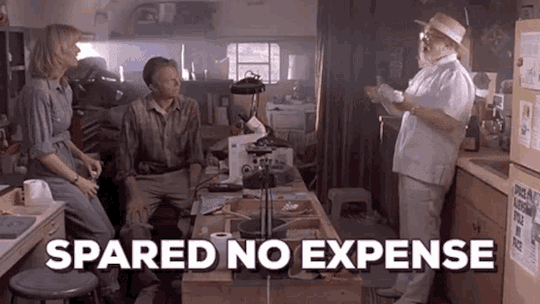
Women are usually asked to do the brunt of the nudity and I have long felt that wasn't fair and it was exploitative whether intentional or not.
I just think if you are going to ask actors to be vulnerable, everyone should do it or no one should do it.
I also think we need to see more normal non-porn genitals. Like, you can't brag about your progressive all-inclusive nudity if you slap a giant fake wang on every time.
/end tangent
And now, the spoilery part...
The big twist, which is really only a big twist for a character in the show and not the audience, is that the Blue Eye Samurai was born a girl. To avoid capture and death they essentially hid in a different gender identity. And I'm trying to decide if this is a trans story or not.
Sometimes it felt like the show was bluntly saying, "She's a girl. See, she has boobs and no penis. And we make a big deal about her getting caught naked. It's like Mulan!"
But then the show kinda/sorta implies that while identifying as a man was a tactic at first, the Blue Eye Samurai came to feel much more comfortable as a man most of the time and only revealed their feminine attributes to a select few. They also had a binding scene which felt like intentional trans imagery.
Since there wasn't the same concept of trans-ness in 1600s Japan as we understand it in modern times, I'm having trouble determining if this is just an homage to Mulan that wasn't thought very deeply about, or if this is allegory exploring a trans identity.
It is unclear if the identity was chosen purely out of necessity or if there was more to it.
Was it like... they tried on a coat because it was cold, but then they really liked how it fit and made it an essential part of their wardrobe?
Or was it just pure pragmatism? If they don't wear the coat they will die from exposure.
I'm worried they wanted to stay close to that line where they could say it wasn't a trans story if that ended up being more convenient. I don't know. I'm fine with allegory and I really enjoyed how they did it with Nimona, but this felt more deliberately ambiguous and it frustrated me a bit. It would be nice if we could just have blatant trans stories that didn't need to hide in ambiguity to avoid controversy. But maybe there were more obvious things I missed and my confusion is unwarranted.
I also think an argument could be made for ol' Blue Eye being genderfluid. Actually genderfluid would make a lot of sense. Their masculine side is the stoic warrior and their feminine side is their vulnerability, love, and humanity—reserved only for those most trusted. And when the two blend and they are a warrior woman they get super horny. So the entire spectrum is there.
I'm sure there will be a long complicated video essay analyzing this gender dynamic.
/end of spoilery section
In any case, I think if you liked Kill Bill, this might be a show that interests you. It has much less cultural appropriation and blatant stereotyping. No Pussy Wagon, but there is a cool horse. And they did use an all East Asian voice cast, so that representation was cool. And the co-showrunner was Japanese, and I think that influence definitely made a difference.
I give Blue Eye Samurai 7.5 Froggies out of 10.
43 notes
·
View notes
Text
The Quantum Quarrel: When Schrödinger's Cat Met King Louis XVI's Waistline
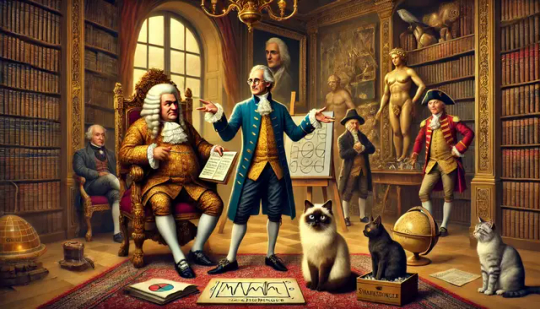
In the bustling corridors of ScienceStyled, a peculiar gathering was underway. Erwin Schrödinger, the physicist famed for his feline paradox, found himself in a heated debate with King Louis XVI, whose appetite for both food and cosmic inflation was legendary.
"Your Majesty," Schrödinger began, adjusting his spectacles, "while your analogy of the universe expanding like your waistline is... vivid, it lacks the precision required for scientific discourse."
Louis XVI, patting his ample stomach, retorted, "Ah, but dear Erwin, my girth provides a relatable metaphor for the masses. After all, who hasn't experienced a little expansion after a grand feast?"
As the two continued their spirited exchange, the Egyptian god Thoth, moonlighting as the archivist of all knowledge, intervened. "Gentlemen, perhaps we can find common ground. Science and art are not adversaries but allies in the quest for understanding."
At that moment, a portal shimmered open, and out stepped D'Artagnan, the swashbuckling musketeer. "I hear there's a duel of wits! En garde!" he exclaimed, brandishing his rapier.
Before anyone could respond, the archangel Gabriel descended, trumpet in hand. "Enough of this bickering! The heavens demand harmony between science and art."
Suddenly, a loud meow echoed through the room. A box appeared, and from it emerged Schrödinger's infamous cat, looking rather displeased. "Really, Erwin? Again with the box? Can't a cat enjoy a nap without being a thought experiment?"
The room fell silent. Then, Blackbeard the pirate burst in, a parrot on his shoulder squawking, "Science ahoy!" He eyed the cat. "Is that feline up for adoption? I could use a ship's mascot."
As the eclectic group pondered the pirate's proposition, a realization dawned upon them. In their absurd convergence of characters and concepts, they had inadvertently demonstrated the very essence of ScienceStyled: that through the fusion of art and science, even the most complex ideas can become accessible—and entertaining—to all.
And so, with a collective chuckle, they agreed to collaborate, blending their unique perspectives to illuminate the wonders of the universe. After all, if a physicist, a king, a god, a musketeer, an archangel, a cat, and a pirate could find common ground, perhaps there was hope for humanity yet.
0 notes
Text
On the matter of "Faction Conflict" in roleplay.
Hello good readers one and all, it has been a bit of time. I have for the most part been simply busy RPing or generally engaging with that strange realm called 'real life'. I was given a drop about the latest weirdposting thread courtesy of Hatescale/Dargeus/Santern regarding his effusive praise, or some may say delusion, for Faction Conflict RP, or WarRP I suppose you could call it.
RP PvP has always been contentious on Argent Dawn, going as far back as the fabled on and off conflicts between the 'North' Rpers and whatever brand of Undead or Blood Elf roleplayers were present. It has been a source of more drama and discourse rather than actual character development and narrative storytelling. Don't let anyone otherwise tell you. It can be a fun distraction and has been the source of many hilarious memes over the long years of Argent Dawn's existence but it cannot seriously be considered on the same level as normal RP.
I noticed that some friends of mine have pointed out that WarRP is no better than other forms of roleplay that don't really fit with the setting. We're talking on the level of Witcher RP, GoT RP, Boardwalk Empire RP. That is certainly the case these days. The lore is an ever evolving and changing - for better or worse- thing. The era of BIG WAR has passed with Legion and BFA.
But there are a handful of groups - you know who I mean - who are adamant on remaining locked into this clown fiesta of an RP mode. Usually I am of the opinion as those who may have read previous posts I've made, that there's a balance to strike between anything goes and grounded in the setting. Lets not kid ourselves that the primary pursuers of RP PvP are after a power trip rather than actual RP interaction, the mechanics behind it entirely gear towards your standard toxic pvp bros who think that the only meaningful interaction is /duel. Why not settle your differences in Counterstrike? A far more balanced game mechanically.
Even that alone isn't truly the issue, strange players can do strange things as long as they're not infringing on anyone else as far as I care. What truly is the problem is that they elevate their - type - of RP as the sole and only true arbiter of RP, the litmus test for self-awareness, to quote Santern himself.
Had this been in Legion or BFA, sure I'd say WarRP has a place but it's time has long passed. It really started during WoD when the lack of actual expansion relevant material that players could engage in forced players to 'write' their own 'lore'. The results being that many lazy roleplayers got hooked on the quick fix of RP PvP campaigns and did no upkeep on their own guilds, only thriving from one campaign to the other and even recruiting non-roleplayers to make sure that they 'won' their fights.
So by all means engage in your WarRP, but you're no better than the 'Darkshire RPers' - whatever that is meant to mean - or any other niche community.
1 note
·
View note
Text
This is the obscene can seduce, as can sex and pleasure. Even

the most anti-seductive figures can become figures of seduc-
tion. (It has been said of the feminist discourse that, beyond
its total absence of seduction, there lies a certain homosexual
allure). These figures need only move beyond their truth into
a reversible configuration, a configuration that is also that of
their death. The same holds true for that figure of anti-seduction
par excellence, power.
Power seduces. But not in the vulgar sense of the masses'
desire for complicity (a tautology that ultimately seeks to ground
seduction in the desire ofothers) . No, power seduces by virtue
of the reversibility that haunts it, and on which a minor cycle
is instituted. No more dominant and dominated, no more.vic-
tims and executioners (but "exploiters" and "exploited," they
certainly exist, though quite separately, for there is no reversi-
bility in production - but then nothing essential happens at
this level) . No more separate positions : power is realized ac-
cording to a duel relation, whereby it throws a challenge to so-
ciety, and its existence is challenged in return . If power cannot
be "exchanged" in accord with this minor cycle of seduction,
challenge and ruse, then it quite simply disappears .
At bottom, power does not exist. The unilateral character of
of the relation of forces on which the "structure" and "reali-
ty" of power and its perpetual movement are supposedly in-
stituted, does not exist. This is the dream of power imposed
by reason, not its reality. Everything seeks its own death, in-
cluding power. Or rather, everything demands to be exchanged,
reversed, and abolished within a cycle (this is why neither
repression nor the unconscious exist, for reversibility is always
already there) . This alone is profoundly seductive.
1 note
·
View note
Text
Revolutionary Moderation: A Founding Father's Guide to Navigating the Political Landscape
Ah, my fine friends and fellow citizens! Gather 'round as we embark on a journey into the realm of political moderation, with unmatched wit and wisdom from one of the esteemed Founding Fathers of our great nation. Brace yourselves, for we are about to tread on revolutionary ground! In a world filled with extremes, where partisan battles rage, and ideological warriors clash, it is the duty of the politically moderate to rise above the fray. But fear not, for we shall do so with a twinkle in our eye and a mischievous smile, for moderation doesn't have to be dull. No, no, my dear friends, it can be a vibrant dance between the left and the right, crafted with the finesse of a pen stroke on the parchment of a constitution! Step 1: Embrace Balance As a politically moderate individual, one must embody the art of balance. Just as I, Benjamin Franklin, chose to balance my experiments with a sturdy kite and key, so too must you balance the polarizing forces of politics. Seek common ground, and let compromise be your trusty companion. Remember, we didn't build this great nation through stubbornness or obstinacy! Step 2: Engage in Civil Discourse Ah, the glory of eloquent debates and intellectual duels! When engaging in political discussions, do so with the grace of a virtuous orator. Share your thoughts, listen attentively, and refute arguments with thoughtful counterpoints. Remember, my friends, persuading others is much more effective when done with reason and respect, rather than with the sharp tongue of a detractor. Step 3: Seek Truth in All Things As seekers of truth, it is our duty to approach each issue with an open mind, free from biases and preconceptions. Evaluate the evidence, scrutinize the arguments, and let reason be your guide. For it is through a tempered and inquisitive mind that the path to true understanding will be illuminated. Step 4: Be Open to Change Ah, dear friends, change is the lifeblood of progress! As politically moderate beings, we must resist the seductive pull of stagnation. Embrace new ideas, always be willing to reevaluate your stance, and adapt in the face of new information. Remember, an unyielding heart is the antithesis of moderation! In conclusion, my esteemed compatriots, let us cast aside the shackles of ideological rigidity. Let us march boldly into the realm of political moderation, armed with wit, wisdom, and a firm grasp on the ideals of our beloved nation. Remember, whether you lean to the left or to the right, the dance of moderation can be a mighty fine jig indeed!
0 notes
Text
Heather Cox Richardson
August 27, 2022 (Saturday)
In a speech Thursday night, President Joe Biden called out today’s MAGA Republicans for threatening “our personal rights and economic security…. They’re a threat to our very democracy.” When he referred to them as “semi-fascists,” he drew headlines, some of them disapproving.
A spokesperson for the Republican National Committee called the comment “despicable,” although Republicans have called Democrats “socialists” now for so long it passes as normal discourse. Just this week, Senator Marco Rubio (R-FL) called Democrats "radical left-wing lunatics, laptop liberals, and Marxist misfits." (THEY CAN DISH IT OUT BUT CAN’T TAKE IT)
Biden’s calling out of today’s radical Republicans mirrors the moment on June 21, 1856, when Representative Anson Burlingame of Massachusetts, a member of the newly formed Republican Party, stood up in Congress to announce that northerners were willing to take to the battlefield to defend their way of life against the southerners who were trying to destroy it.
Less than a month before, Burlingame's Massachusetts colleague Senator Charles Sumner had been brutally beaten by a southern representative for disparaging slavery, and Burlingame was sick and tired of buying sectional peace by letting southerners abuse the North. Enough, he said, was enough. The North was superior to the South in its morality, loyalty to the government, fidelity to the Constitution, and economy, and northerners were willing to defend their system, if necessary, with guns.
Burlingame’s “Defense of Massachusetts” speech marked the first time a prominent northerner had offered to fight to defend the northern way of life. Previously, southerners had been the ones threatening war and demanding concessions from the North to preserve the peace. He was willing to accept a battle, Burlingame explained, because what was at stake was the future of the nation. His speech invited a challenge to a duel.
Southerners championed their region as the one that had correctly developed the society envisioned by the Founders. In the South, a few very wealthy men controlled government and society, enslaving their neighbors. This system, its apologists asserted, was the highest form of human civilization. They opposed any attempt to restrict its spread. The South was superior to the North, enslavers insisted; it alone was patriotic, honored the Constitution, and understood economic growth. In the interests of union, northerners repeatedly ceded ground to enslavers and left their claim to superiority unchallenged.
At long last, the attack on Sumner inspired Burlingame to speak up for the North. The southern system was not superior, he thundered; it had dragged the nation backward. Slavery kept workers ignorant and godless while the northern system of freedom lifted workers up with schools and churches. Slavery feared innovation; freedom encouraged workers to try new ideas. Slavery kept the South mired in the past; freedom welcomed the modern world and pushed Americans into a new, thriving economy. And finally, when Sumner had spoken up against the tyranny of slavery, a southerner had clubbed him almost to death on the floor of the Senate.
Was ignorance, economic stagnation, and violence the true American system?For his part, Burlingame preferred to throw his lot with education, morality, economic growth, and respect for government.Burlingame had deliberately provoked the lawmaker who had beaten Sumner, Preston Brooks of South Carolina, and unable to resist any provocation, Brooks had challenged Burlingame to a duel. Brooks assumed all Yankees were cowards and figured that Burlingame would decline in embarrassment. But instead, Burlingame accepted with enthusiasm, choosing rifles as the dueling weapons. Burlingame, it turned out, was an expert marksman.
Burlingame also chose to duel in Canada, giving Brooks the opportunity to back out on the grounds that he felt unsafe traveling through the North after his beating of Sumner made him a hated man. The negotiations for the duel went on for months, but the duel never took place. Instead, Brooks, known as “Bully” Brooks, lost face as a man who was unwilling to risk his safety to avenge his honor, while Burlingame showed that northerners were eager to fight.
Forgotten now, Burlingame’s speech was once widely considered one of the most important speeches in American history. It marked the moment when northerners shocked southerners by calling them out for what they were, and northerners rallied to Burlingame’s call.
President Biden’s Twitter account has recently been taken over by new White House's Deputy Director of Platforms Megan Coyne, who garnered attention when she ran the official New Jersey Twitter account with attitude, and it seems as if the administration is taking the new saltiness out for a spin. “All the talk about the deficit from the same folks that gave an unpaid-for $2 trillion tax cut to the wealthy and big corporations. It makes you laugh,” the account said tonight. “Under my Administration, the deficit is on track to come down by more than $1 trillion this year.”
MY COMMENT:
not one Democrat is defending Nancy Pelosi's husband's DUI, but the whole raft of Christofascists keeps defending the Mango Mussolini and clutch their pearls and cry "foul" when they get called out. They can go bite it!
8 notes
·
View notes
Text
So there’s an amusing quirk of a particular set of discourse norms on the internet. Fairly rare, though I have seen it in the wild on a number of occasions. I believe the source norms are:
Online discourse/debate is basically verbal sparring and is mostly valuable for its own sake
Discussions typically end with both initial positions fortified against each other, and this is good
Good faith argument means arguing against the strongest possible version argument against your position (”steelmanning”)
I have my disputes with each of these norms (and my doubts about when and how they tend to be applied), but I appreciate their utility. However, a particular (and rare) interpretation of these discourse norms suggests that if your opponent makes a terrible argument, you should not aim to convince them of your own position, but should come up with a better argument against your own position for them to use. After all, if they were convinced of your position then there would be no grounds for further discourse, which would be tragic.
Now, where it gets really comical is when your opponent in a discussion upbraids you for your dereliction of duty in not giving them a good argument against your position (failure to “steelman”). A common way this works is that one party makes a weak argument, has it torn to pieces, and then asks their opponent to provide them a better one and is offended when one is not provided. To them, what you have done is the height of rudeness, like showing up to a duel without a pair of matching weapons to use.
Again, this is extremely rare. I’ve only seen it a couple times, mostly happening to other people, but I wanted to tell people to watch out for it, because it is funny every time.
4 notes
·
View notes
Text
@embershroud108
Re: Medea
Hah, I was considering bringing up Medea as another fave but I consider her behavior borderline self defense 😉 respectively very clear in the "not responsible for her actions due to madness". Basically Medea to me just so obviously gets screwed over by everyone? And contributes relatively little to her own downfall? She is like closer to Ophelia than Hamlet in my recollection when it comes to personal responsibility in "she goes mad at the end because she was fucked over so much" rather than "her fucking people over while mad is the plot" or "she goes mad because she fucked people over".
And it's been a long time since I read the Iliad but doesn't Achilles have more of that kind of "attack dog" style respect rather than more traditional "nobility" as such? Or am I confusing the source material with that meh Brad Pitt movie LOL
That movie sure was shitty. Again, My Iliad was a long time ago as well and I might be confusing some of it with the non-licenced sequels like Penthesilea by Kleist, but I feel like there’s a fair amount of “random sub boss/Trojan ally warriors shows up, fights with Achilles and everybody is all impressed and noble duel like”?
Plus I think with in the “cast” of the Illiad I think there are just other characters that are more cast as the dumb brute? (just like others are “the old wise man” and “the smart one”) I don’t feel like Achilles being particularly violent in combat was that much of topic? (like outside of avenging his boyfriend which I would say is basically within his downfall arc) Like obviously he murders a fuckton of people but I don’t think that that is considered a negative by the story/he is not much more violent than the other warriors and it wouldn’t have hurt his reputation within the Greeks. Like it feels like there are about half a dozen different “and then x pissed off the gods because they slaughtered a priest’s family”.
From my memory isn’t more traditional Illiad discourse about whether it was morally okay of him to disobey his general/leave his team hanging when he is quarrelling with Agamemmnon over loot?
Imo Achilles is clearly exalted, he’s the subject of a prophecy, multiple people bend over to get him/protect him, the whole war stops more than once based on his availability, he is clearly by everybody to be understood as the best at what he does.
I always got more a haughty/prideful vibe from Achilles than a violent one (that’s why he thinks he deserves arguing with his boss over loot).
Sadly the idea came to be really late, but imo Anakin Skywalker is a really interesting case for tragic hero/anti hero/sympathetic villain.
He clearly is respected/exalted, basically object of a prophecy, special abilities beyond everybody else, respected as a “General Skywalker”, beautiful princess wife who loves him.
Arguably brought down by honorable intentions (wanting to save his wife).
Both negative (anger, violence, hides his forbidden relationship, cocky) and positive traits (generally a good fighter, generally tries to be a good friend, loves his wife genuinely).
And of course redeems in the end to some extent. (but still pays with death)
I still feel that while he has the personality traits of a tragic hero, I wouldn’t say that Star Wars 1-6 feels necessarily like a clean cut tragic hero story, I would say middle ground between sympathetic villain origin story and tragic hero?
I think it structurally doesn’t feel like a pure tragic hero tale because he has Obiwan as like his co-lead. And imo Obiwan works as a counter argument to Anakin, he shows that you can not give into evil (yes even with the stipulation that Obiwan does not share Anakin’s backstory of growing up as a slave and losing his mother). And by comparison the Shakespearen plays feel a lot more locked into the POV of their protag and the progression hence feels more on rails.
(actually, I do not think that Vi serves as Jinx’s Obiwan in that regard, because imo Jinx’s and Vi’s stories are quite different/have different topics and destinations? While Obiwan and Anakin are in very similar situation as Jedis and go through similar or even the same adventures but the outcomes are different. Like if both Vi and Jinx had been raised by different evil overlords and Vi had resisted and Jinx hadn’t (speaking of which “the hero’s dark mirror” is imo another category of sympathetic evil doers that I do not think amount to them being tragic heroes even if their whole point is how similar they are to the hero, but their purpose within the story is mostly contrast and reflect the hero rather than to be their own story and entity)
btw I think Scarlett O’Hara is an excellent example of hero vs villain making no sense. Is she a hero? imo no way. Is she a villain? Also not really. She is above all the protagonist.
1 note
·
View note
Text
Yugioh S3 Ep 29-30: LAVA GOLEM
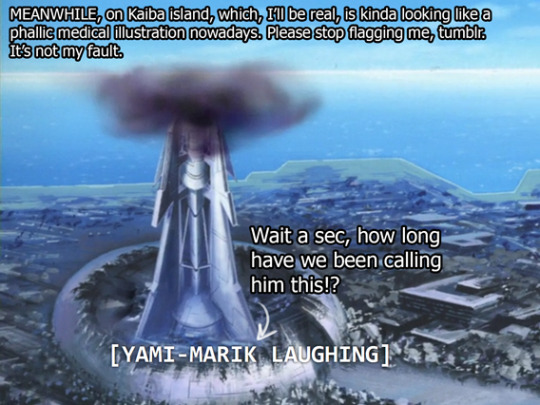
Ah, Kaiba island.
I’m not quite sure how big Kaiba island is. In this picture it looks like we got ourselves a 6 story building on the side, but if we compare the 6 story building to the tower it’s like...that’s a 100 story building, roughly? Our art team has given up trying to make this building look like anything other than what it looks like, and they’re just going to make a metallic cross-section of a dick every time it shows up.
Also, I kinda wish we saw a little bit more of the landing sequence to get here because....
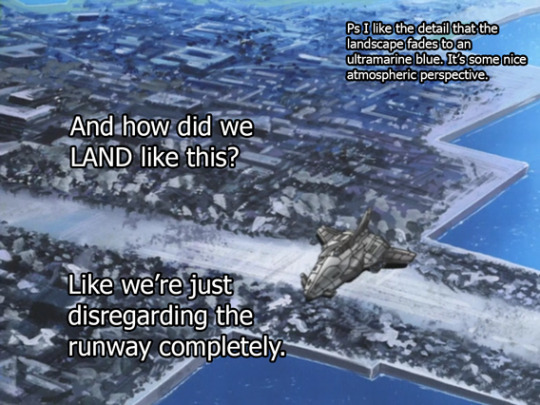
....did we do an Akira motorcycle slide into this island or is that just me?
Meanwhile, as Joey is duking it out on the world’s largest, coldest dildo, Serenity is stationed at the post she made for herself.
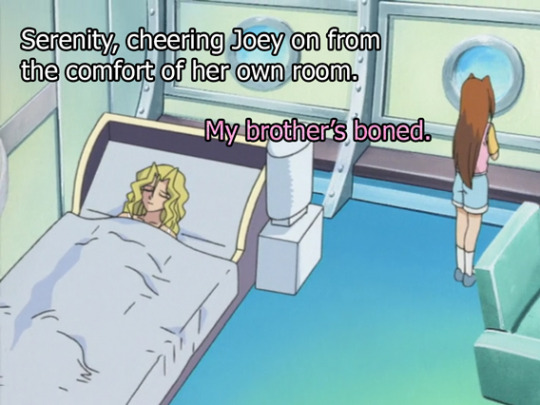
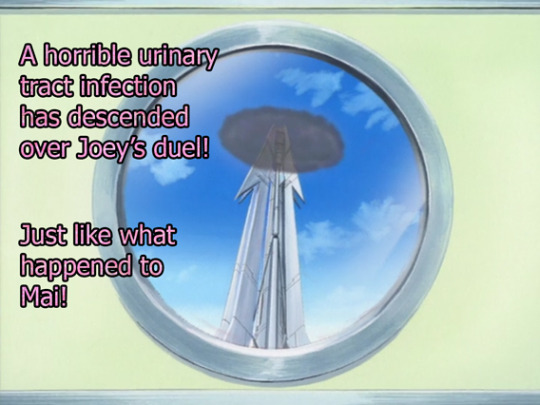
LOL Why did they do this? Why would they design this?
(read more under the cut)
Inside the swamp cloud, Marik is shocked that Joey has been largely unphased by this horrific experience.
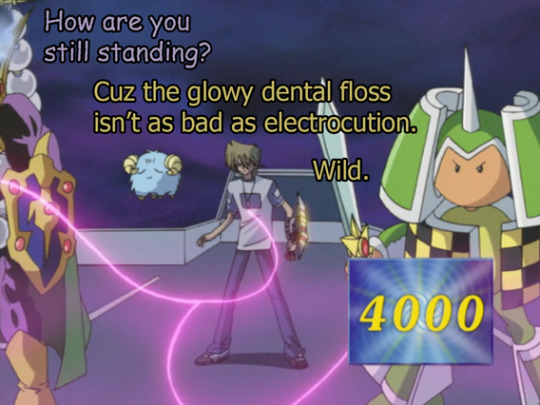
Clearly Marik has not caught on that Joey’s been conditioned to this stuff living with Yugi for the past many years, and a little bit of pink spirit-sucking wires aren’t really much of a match for that time Joey saw Yugi light a guy on fire with a match once. Well, a lighter. Either way, this isn’t so bad.
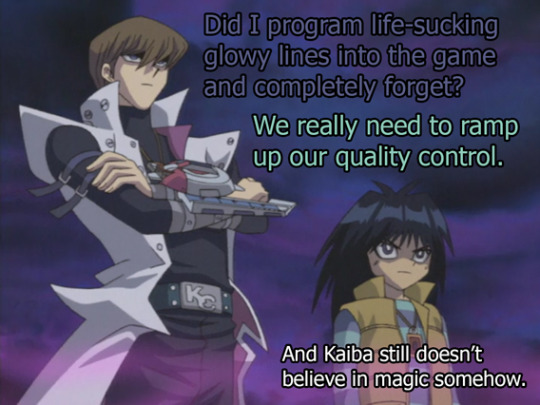
And then, I don’t really talk about card games here, but Marik introduces a new card I have not seen before.
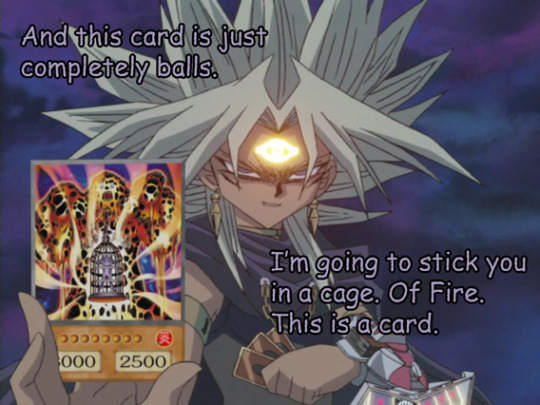
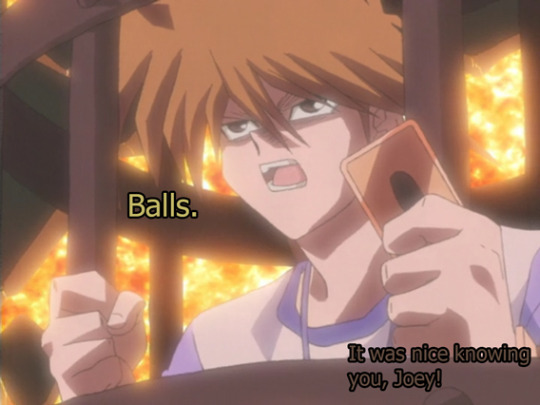
Behold, Lava Golem.
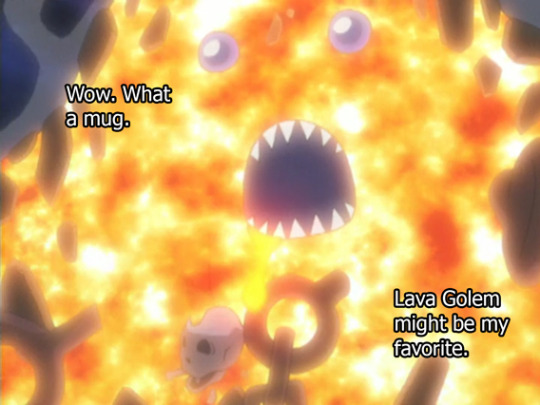
Look at him! Like I know everyone’s kinda freaking out about the new pokemon but like...Lava Golem? Remember that sweet face?
He’s just soooooo good.
Man this is the first Yugioh card ever that I’ve actually liked.
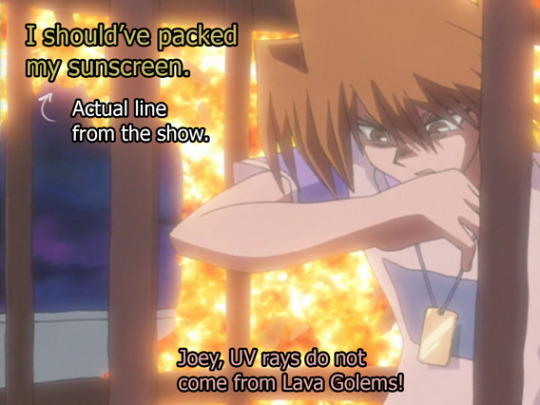
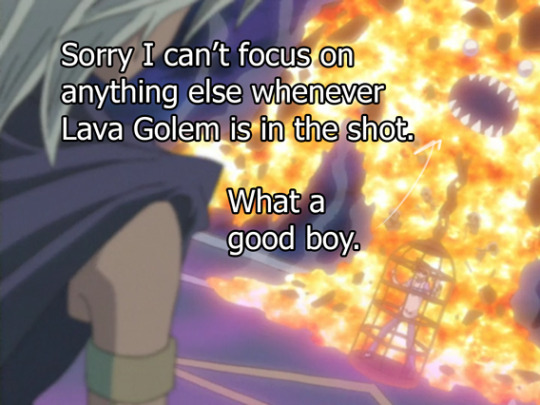
And, upon seeing this terrifying situation, Tea turns to Yugi and says:
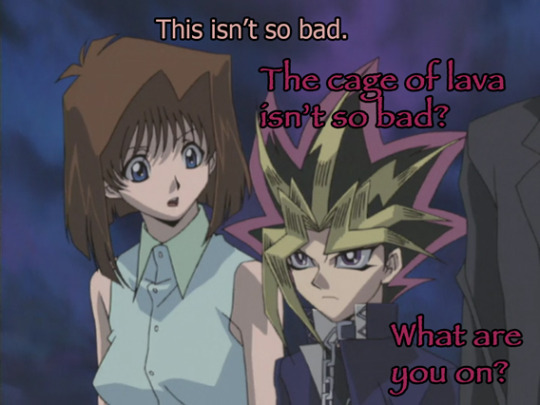
Thanks Tea.
Also during these few episodes, Marik is starting to undergo a transformation, mostly via his viens. It’s a look. Kind of worried about his blood pressure.
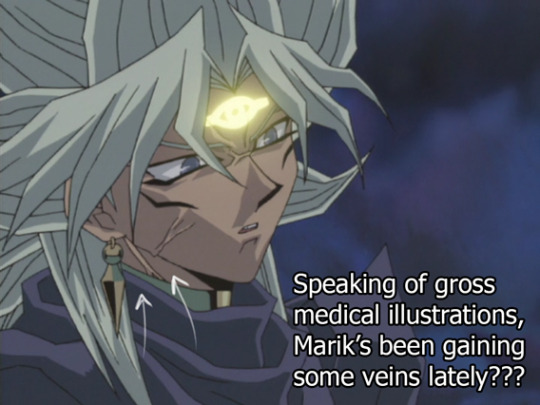
And I was thinking that they just invented a a chin vein, but, as it turns out, they actually did their research.
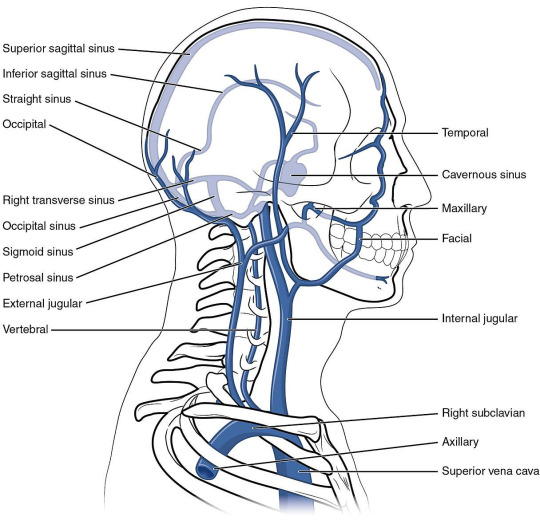
There is a vein there! I mean this isn’t really that big a deal to most of you, probably, but anime often gets a bad rap for ignoring anatomy (which ... it’s a cartoon so yeah that’s...that’s what you do in cartoons, you ignore most anatomy) but hey--they got this vein correct. I don’t know why they even bothered, but that was very nice of them to make something so gross so correct.
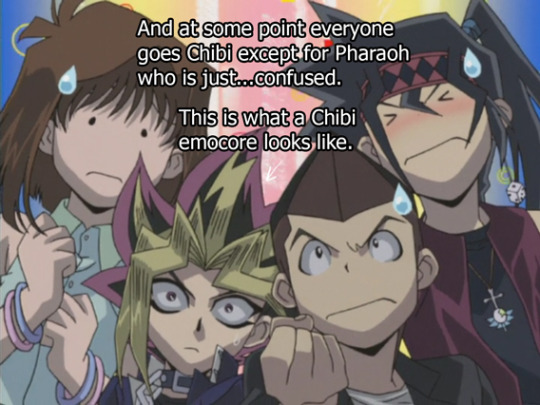
And because some of you might want this just for yourself, cap free:
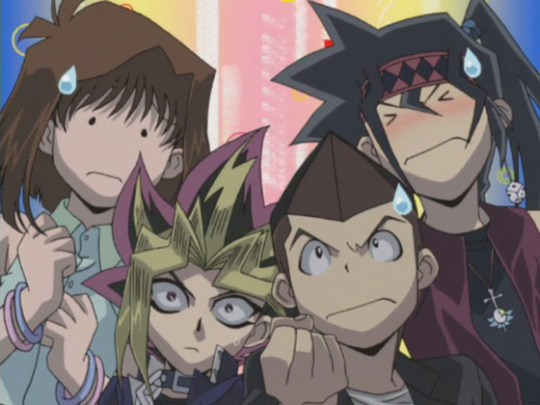
Enjoy.
Along with this good boy.
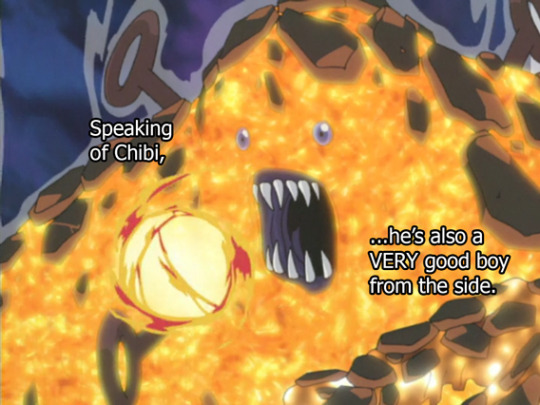
Is it just me? Is it just me that’s all ham about this Domo Kun face? This Mario mini-boss?
I usually don’t like the Yugioh monster designs but this one is just...he’s such a good boy.
Anyway, the art team was told at some point to change piss cloud and they decided to do this instead
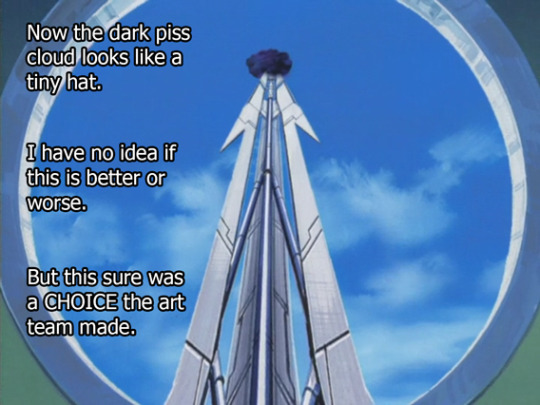
Why does the width keep changing on the tower? Like I know it was tossed between different artists but like...it just...it keeps changing and it bothers me.
Anyway, back to what matters.
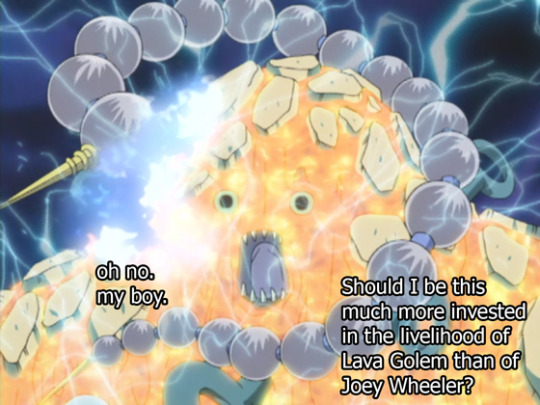
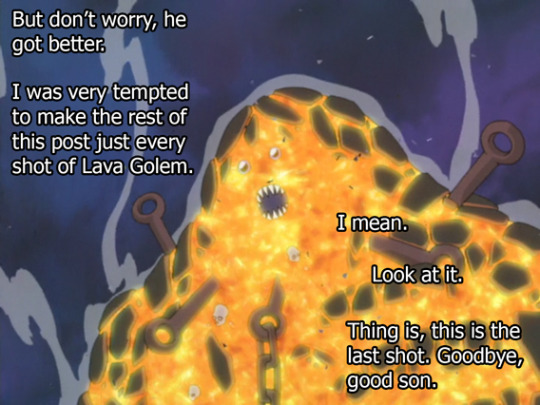
Can this be our new Joey Wheeler? Just leave everything about Joey Wheeler the same but replace his sprite with Lava Golem and with no explanation. I’d be down.
I do think that this arc brought back their A-team for the animation, there was just a lot more going on visually than we’ve had in a good while. Like this Marik face, for instance--this very famous face that I’ve seen drawn on like...a whole lot of characters. This is a much-referenced pose.
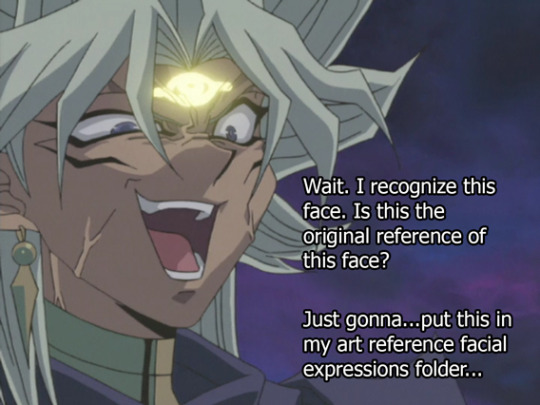
I mean, hey, not using reference while drawing is the same as dueling as Yugi Muto and just never using the Pharaoh. Like sure you could, but never, ever, ever do that.
And I just want you to know, I held that really corny anime art joke in for like a straight week on twitter as the entire world was going off about whether or not you’re supposed to use reference materials when you draw as if this is some sort of controversial topic (it’s not. No one cares about your process.) and y’all, it was HARD. But I did it. I resisted the discourse and still found a way to sneak it into here, into the side blog where I can go off about the inane art twitter discourse without getting blocked.
Which, again, was about “Can I use reference?” I...art twitter. Art twitter, I swear. why would you NOT? You have the Pharaoh, art twitter. You have the Pharaoh.
Anyway, I hope at least one of you got that joke. I hope one of you at least was like “lol--Art Reference is the Heart of the Cards.” and the next time someone tells you that using reference is cheating (which will never happen, a infinitesimal number of people in one forum on DeviantArt in 2003 said this once in the entire history of art, and I don’t know why twitter is fighting with these child-run forums that don’t even exist anymore) you can say “Don’t you dare talk about my platonic soulmate that way.” and just end the argument there.
The hell are these people who say artists don’t use reference? Do you write history papers without reading books?
And that’s my rant that was a.) too long for twitter and also b.) maybe too much anime. With art twitter it’s like..there’s no middle ground between too much anime and not enough anime. No middle ground and I have no idea where the people who follow me even stand. I think they just want to see Zelda. I think that’s about it. I really can’t tell with them. I’m like...always confused as to what those people want.
I need to delete my twitter. Anyways, back to Joey, who felt like breaking the fourth wall.
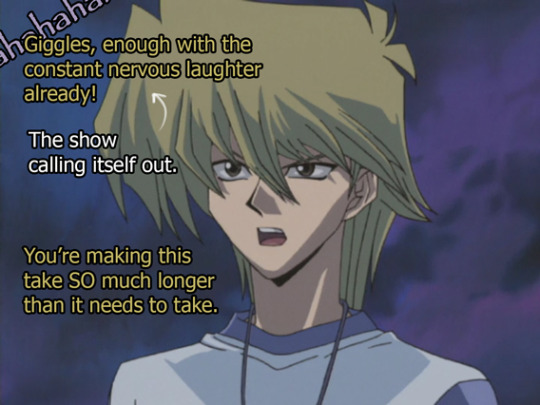
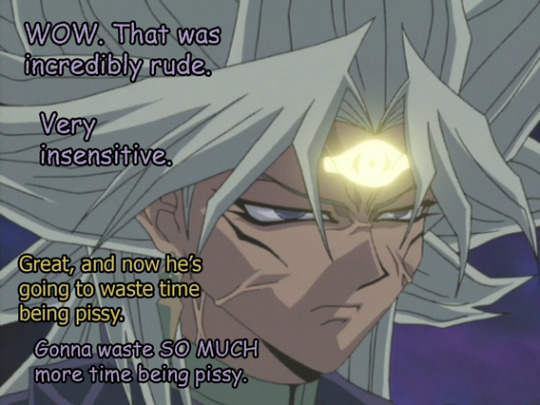
And so Marik decides to sober up and play the God card.
Yo guys, remember God Cards? I’ll be honest, I kinda completely forgot about them.
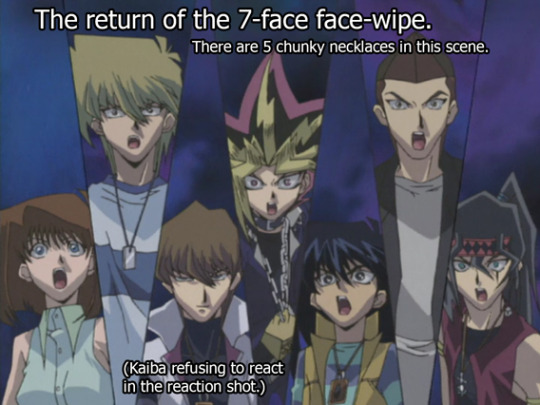
And then at some point this shot happened and I was living for it.
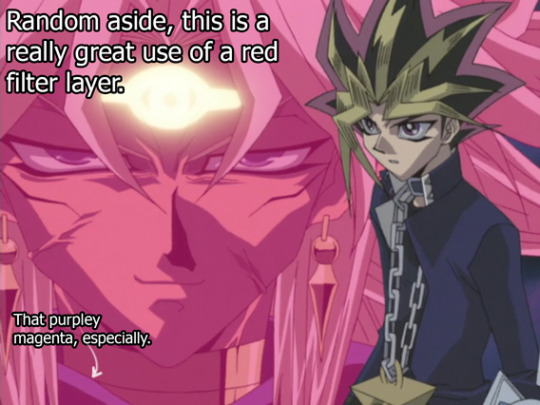
such a good idea to offset people in a different filter and kinda stack em. Bro was saying he remembered this sort of thing in Cowboy Bebop but I don’t remember what the hell he’s talking about. Bro and his spicy headcanons are mixing up Yugioh and Cowboy Bebop now. Never thought I’d see that.
And then Kaiba’s muscles kinda twitched and it looked like smiling.
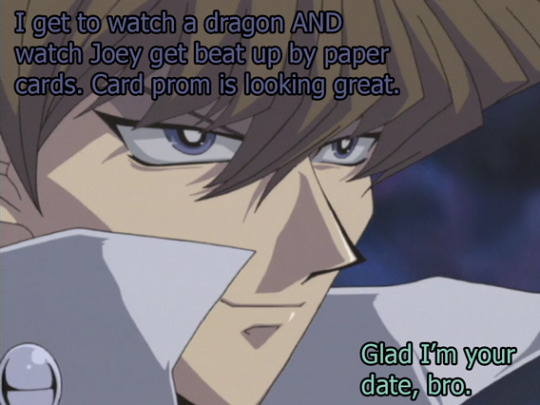
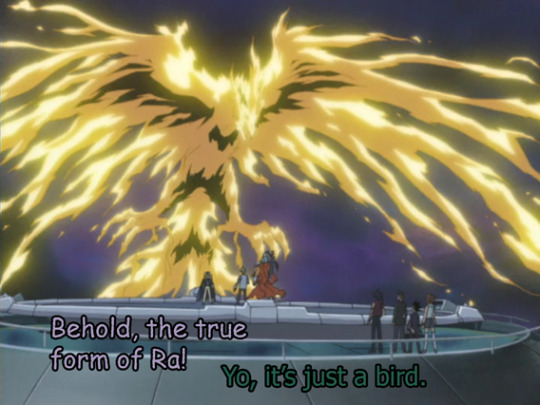
Man, were there a lot of phoenix references in the 00′s or is that just me who read way too much Harry Potter?
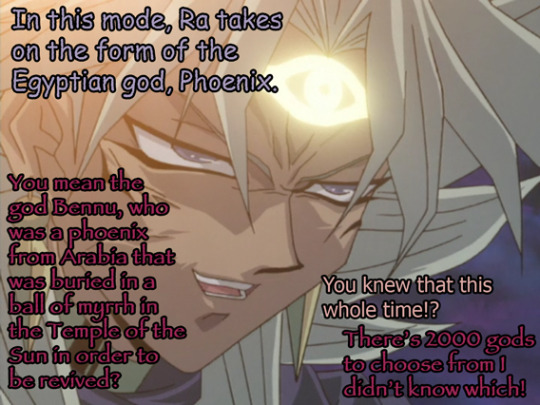
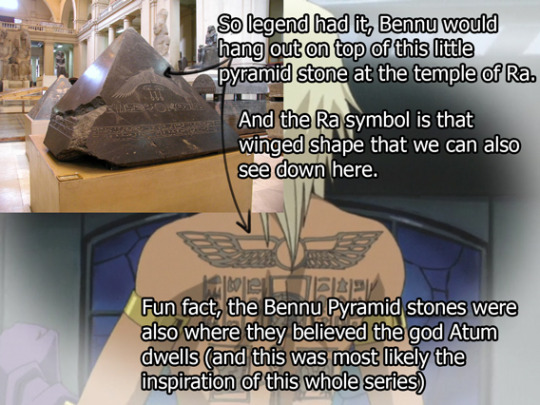
And like, because I do draw Yugi sometimes, occasionally people will reblog and tag with Pharaoh’s real name in there (I can’t really avoid that spoiler), so I think it’s pretty likely his name comes from Atum of Egyptian legend. Who...wasn’t really a Pharaoh. Atum was kinda weird, he gave birth to...himself. He’s an interesting read. But, we’ll get there when we get there.
But, I didn’t really know about Bennu pyramids until I actually went and looked up Egyptian Phoenixes. I had always thought that the Phoenix was Greek in origin but, according to Wikipedia some people say it happened in Egypt as well. And if it’s good enough for Wikipedia, it’s good enough for Yugioh.
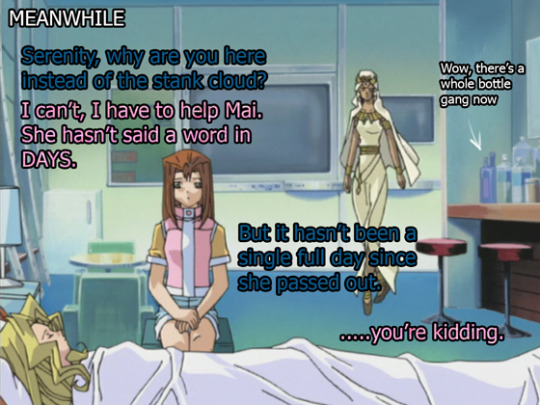
The return of the mystery purple moisturizer jug and it brought it’s entire extended family of fiji waters.
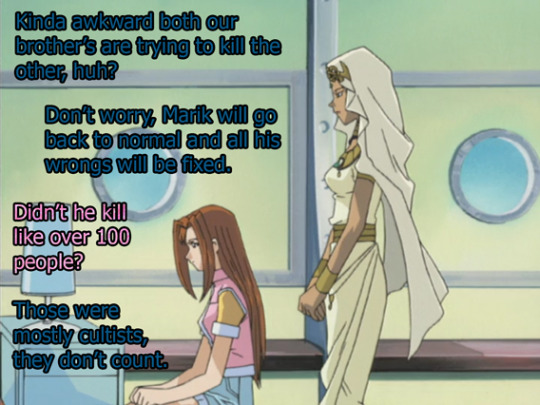
And so, Ishizu decides to do the right thing and take care of Mai. Not sure what Ishizu knows about being a nurse since she lived underground, but since she can help cure poisonous snake bites, maybe comas are a little bit easier?
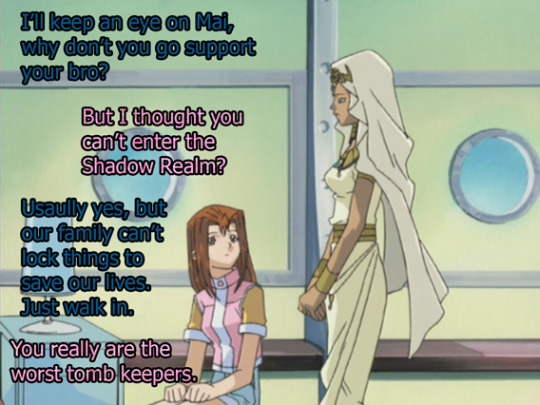
And so Serenity starts the 30 minute jog up the phallic tower to get to Joey’s death sequence. She’s made it to about...20 ft outside of the plane by the end of this episode. Serenity runs kinda slow.
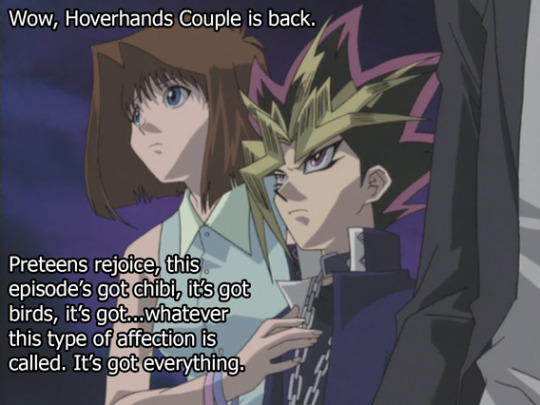
Bro mentioned that he thinks it looks like Tea’s trying to very stealthily steal Yugi’s wallet. And that’s just my spicy headcanon now, too.
Well now that’s over, lemme see if...


.......it could’ve happened. It only has like a couple of human skulls on it.
And hey if this is the first recap you’ve ever seen from me, here’s a link to read them all from the beginning in Chrono order, back when they weren’t color coded and I had no idea what the hell I was doing.
#Yugioh#yu gi oh#yugioh recap#photo recap#episode recap#s3 ep29#s3 ep30#Lava Golem#yugi muto#I wasn't expecting actual egyptian mythology to be in this show#joey wheeler#marik ishtar#serenity wheeler#ishizu ishtar#seto kaiba#tea gardner#tristan taylor#duke devlin
21 notes
·
View notes
Note
About the winning/killing anon (and I'm not tge one who sent it), I'd say the problem is that a reylo duel in TROS looks like more and more a possibility, but it would be difficult to execute one where Ben is the one to win after the SKB one, yet no proper resolution would make it look like it's too obviously only for the flashes. So I think reylos are bracing for the possibility of some heavy angst.
And from Anon:So apparently there’s some intra-fandom Reylo meta discourse where some people are entertaining the idea of Rey killing Kylo in TROS (possibly under dark side influence, I think, I saw a few posts along those lines) and Kylo maybe getting resurrected, and there’s another line of discourse around some people saying Kylo needs to defeat Rey in a duel in TROS since she did the opposite in TFA, and also some people saying Kylo defeating Rey will not and could not happen under any circumstances.
All right, I guess I’ve completely missed that. idk, I find all of this so much arguing over tea leaves since we have no idea whether any of this will happen at all much less how it would be executed.
To me, there’s just utterly no point in another good vs evil fight between them, especially if Rey wins. Even if the point is her being tempted by the dark side like Luke, because literally all of that has happened already. There’s no tension.
I see no reason it would be difficult to portray him as winning (he could even verbally remind her/the audience of how compromised he was the last time but now he’s fit as an ‘oh shit’ moment), but again, there’s no point in that as a simple villain/hero fight because we’ve also already seen Ben win and then abdicate the win for emotional reasons. The straightforward ground was so thoroughly covered in TFA, there’s absolutely nothing left to say. TLJ did the ‘it’s a draw’ thing, that’s out too.
So when/if they fight again, to avoid being boring, redundant or just for show, it can’t be on those terms. On a character level, they need new motivation to want to fight each other seriously enough that it’s a major set-piece and there is tension, and I don’t think that can come from something simple at this point in the proceedings. Some kind of radical shake-up (like Dark Rey vs Light Ben, but that won’t happen) or third option (a twist, such as only pretending to fight or one participant only pretending etc.) is needed. If it’s none of that, it’s probably a cursory fight in the early middle of the movie which ends in a standstill and then they talk. I’d find that very lazy on the part of the writers, but not a huge problem as long as it’s handled carefully.
#spec#episode ix#reylo#if its worst crime is being pointless and obligatory it's not the end of the world#as long as the characterisation isn't harmed#duel#don't call the exorcist we got a happy murder pact#(<--- click this tag for posts dealing with the 'she kills and resurrects him' thing which is NO and wRONG)
19 notes
·
View notes
Text
The Jane Eyre Solution
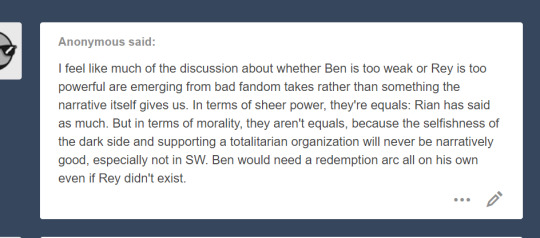
Hi nonny!
Thank you for the ask. I absolutely agree: from what we’ve seen so far in the ST, Ben and Rey are equals in terms of their Force powers, but not their morality. And indeed Ben, not Rey, is the one in need of a redemption arc.
Personally, I find the recent discourse about Ben and Rey’s equality and relative “strength” fascinating. I’ve been trying to make sense of it, which has led me to one of my favorite topics: what Jane Eyre tells us about Reylo.
Buckle in, my dears.
Are they equals?
I’ve talked to many GA members and casual fans, and I think it’s fair to say that the average reasonable viewer (who isn’t sexist or bigoted) has a similar take as I did on Reylo’s equality / strength before I joined active fandom. That is:
(1) Ben was a force to be reckoned with in TFA, but Rey ultimately overpowered him and “won”; and
(2) in TLJ, we saw that unequivocally that Rey and Ben were equally badass / powerful in the Force.
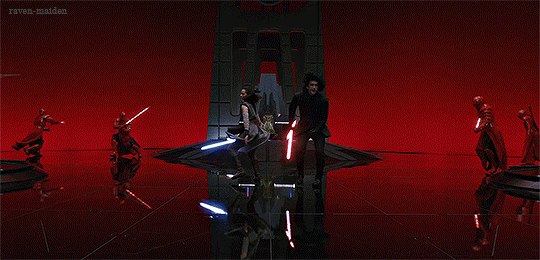
However, since joining active fandom and devouring tons of evidence, I now think the outcome of the fight on SKB is more complicated than Rey "winning.” After all, Ben was greatly weakened at the time, and chose not to kill Rey himself.
The thing is: both of these views on Reylo’s SKB duel are valid. It is fair to say that:
(1) Rey definitively defeated Ben on SKB; and
(2) the SKB duel is consistent with their status as equals in the Force.
Both conclusions are true precisely because of what you mention above, nonny. Because although Ben and Rey are physical equals in the Force, Rey is Ben’s moral superior so far. This explains the key reason Ben “lost” to Rey.
In other words, when we watch this moment:
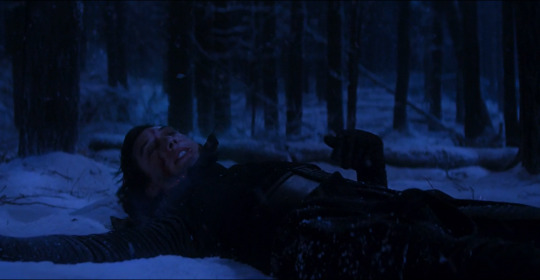
...we are NOT supposed to conclude that Ben is weaker in the Force than Rey. Rather, we are supposed to see Ben’s defeat as a consequence of his own (im)moral choices.
So: Kill Han-- > be spiritually weakened by the “evil act” --> be physically wounded by an avatar of your father (Chewie)--> channel your pain into anger when you realize that something you want is getting away (Rey)--> get defeated by the very thing you tried to possess and dominate.
Further, Ben losing the duel says as much about his own moral failings in this moment as it does about Rey embracing her own moral strengths-- by facing her fears, standing her ground, and channeling the Force to win.
Is Ben emotionally weaker than Rey?
The discourse has extended beyond the question of who is stronger in the Force to include who is stronger in other respects.
Once concern I’ve seen: maybe Rey and Ben are equally powerful in the Force, but Ben has a weaker constitution than Rey. (e.g., he makes puppy dog eyes at her at the end of TLJ, whereas she is firm and resolute).
I think this take completely misses the point.
When we watch Ben stare at Rey here, looking utterly dejected and lost:
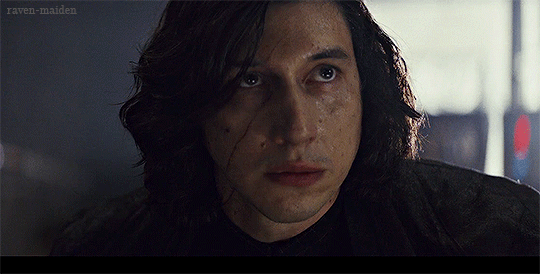
... we are not supposed to conclude that he is a weaker and more “pathetic.” Rather, we are supposed to see him suffering due to the poor moral choices he just made.
Yes, Rey made mistakes. The TLJ novel itself says that Rey made a mistake by thinking that Ben turning on his master would be the same as him turning from the darkness. She oversimplified Ben’s situation. She also inadvertently triggered him by pulling the saber.
But Rey’s mistakes in the Throne Room are not nearly the same in magnitude as Ben’s mistakes in the final act of TLJ. Ben’s mistakes are far greater.
Ben is the one who chose to continue on his dark path of power and destruction over being with the woman he loves. Ben is the one who tried to make Rey feel alone and dependent on him during his proposal so that she would give in. (RJ stated this flat out in an interview with Empire).
Ben’s puppy dog eyes in the final FB were a necessary display of regret, guilt, and sorrow for his wrongdoing.
Now, I want to be clear that Ben is clearly coded a victim of abuse, which should shape how we view his character.

But keep in mind that Ben isn’t merely a passive victim. Seeing him as such takes away all of his agency.
Yes, he’s been victimized, and his scenes with Snoke show us that he deserves sympathy. But after killing Snoke, he made a choice to seize power while urging Rey to “let it all die”-- and this was a choice he made freely.
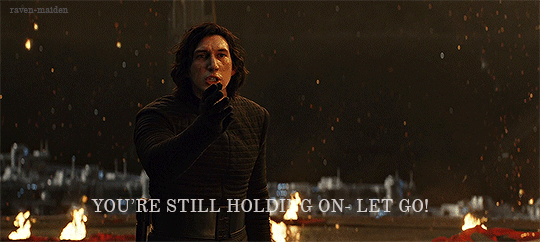
In fact, RJ made it clear that Ben had agency in his choices here.
“I wanted to bring him closer to being the villain he wanted to be in The Force Awakens” (RJ’s TLJ Director’s commentary- 1:55:20)
Ben’s primary motive in killing Snoke was to save Rey, but Snoke’s death also gave him the opportunity to seize something he wanted. And he took it, despite Rey begging him not to.
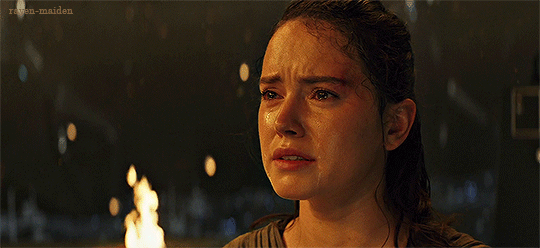
Of course we are supposed to sympathize with Ben despite his poor choices in the Throne Room and on Crait. After all, he has been neglected, brainwashed, and abused throughout his life, and gaining power has been his single-minded focus for some time-- he thinks it’s the right thing to do. And abandonment and betrayal are his triggers.
And yet.
The simple fact is that we can sympathize with Ben, understanding why he made those choices, while still not condoning them.
Which brings me to:
The Jane Eyre Solution
I’m far from the first to say that Jane Eyre is a strong inspiration in Reylo.
However, an appreciation of how strongly Jane / Rochester inspired Reylo’s dynamic as spiritual and intellectual equals, but not moral equals (yet) is woefully lacking. And it’s high time we rectified that.
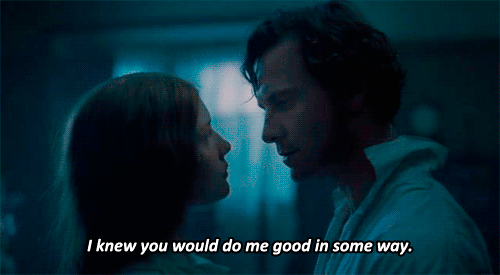
Just take the case of P&P. It’s incorrect to think that Reylo closely emulates that dynamic, because the assumption is that Reylo will eventually come to a place of understanding by rectifying their (comparable) sins-- just like Lizzy and Darcy (e.g., Darcy is proud, Lizzy is prejudiced; Darcy starts things off on the wrong foot, but Lizzy is in the wrong, too).
That’s not Reylo. Because Rey and Ben’s sins are not, and have never been, comparable in magnitude.
With Reylo, just like in Jane / Rochester, we have a significant moral divide between our male and female leads, even though they are soulmates and spiritual / mental equals.

Like Rey, Jane:
Is orphaned and had abusive caretakers
Has a low status in society
Follows a moral code that her modern audience approves of (e.g., showing compassion, protecting the vulnerable, refusing to live in “sin”)
Maintains a strong sense of self
Is desperately seeking her place of belonging
Challenges tauthority figures in her life
Eventually finds friends and a temporary home, but still feels lost without her beloved
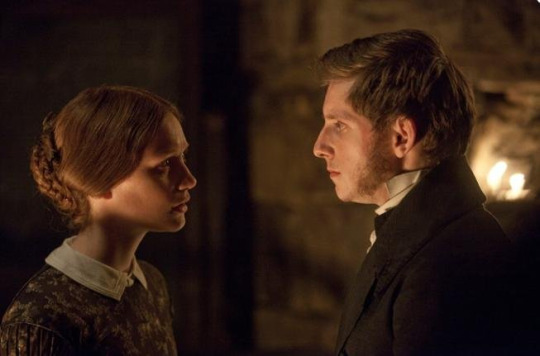
Like Ben, Rochester:
Has a tragic backstory that was not his fault, and prompted his moral wrongdoing.
Follows a moral code that Jane and her modern audience finds unacceptable.
Tries to strong arm Jane into seeing his perspective and doing what he wants her to do, even though it contradicts her morals.
Vacillates between being forceful / domineering and vulnerable / pleading in order to get Jane to stay.
Is possessive. (“I must have you for my own–entirely my own. Will you be mine? Say yes, quickly.”)
Tries to make Jane feel alone and dependent on him right before he proposes.
Has a “You’re nothing” line during his proposal (“You–poor and obscure, and small and plain as you are–I entreat to accept me as a husband.”).
Is completely despondent and has a meltdown when Jane leaves him
Thus, the moral divide in Reylo, like in Jane / Rochester, favors the woman-- it’s the man who makes the critical moral mistakes, and chooses a path that the woman cannot follow.
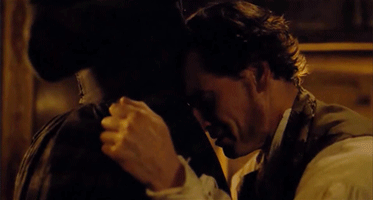
This is precisely why it’s not a problem that Rey defeated Ben on SKB, and why Ben doesn’t have to defeat Rey and spare her life in order to prove that they are equals. Rey’s journey is not about rectifying her “sins.” Rey is on an entirely different arc than Ben is.
Rey and Ben are going to complete their journeys in different ways.
Just like Jane, Rey’s journey is about discovering her own identity, strength, purpose, and self-worth. In IX, we need to see Rey coming to terms with who she is and what she stands for, despite temptations and obstacles that lead her away from the truth.
Perhaps this is why there are rumors that Rey is filming on a Jakku-like location.
Just like Rochester, Ben’s journey is about rectifying his wrongs and choosing a better moral path. This is inextricably tied to him accepting his true identity as Ben Solo. Learning to chose compassion over possession / his sense of self will also be key. (However, unlike Rochester, Ben won’t be “castrated” to earn his redemption, because that would be a puritanical cop-out.)
In conclusion...
Reylo is going to be the consummately equal couple in SW. They are already equal in terms of their Force powers. However, Rey is morally superior to Ben, and she will likely remain that way until the climax of the film-- much in the way that Jane was morally superior to Rochester until the end of Jane Eyre.
To be clear, I’m not talking about the morality of using the dark vs. light side of the Force-- that’s a separate beast. What I mean to say is that Ben has made choices (e.g., Han, seizing power, arguing for death and destruction in building a new order), that are immoral. He hasn’t realized this yet-- but he will in Ep. IX. And he will become Rey’s moral equal.
So really, the differences we see in Rey vs. Ben’s vulnerabilities, mistakes, and “losses” in the ST reflects the fact that they have different journeys as characters.
Although both Ben and Rey are seeking belonging, Ben’s journey is about making better moral choices and accepting his true self, whereas Rey’s is about finding herself.
In Reylo, just like in Jane/Rochester, they will enjoy a HEA after undergoing their necessary growth / transformation as individual characters, and finally meet as true equals at last-- in every sense of the word.

Nonny, you got way, way more than you bargained for. 😂 But this was too much fun, and it gave me an excuse to write about Reylo and Jane Eyre- my two all-time favorite ships. Thank you for the ask!
303 notes
·
View notes
Text
Part II: Sci-Fi and Horror
Considering Berlant’s point that the present is “a mediated affect ... a temporal genre whose conventions emerge from the personal and public filtering” we consider how genres of contemporary literature implicate our understandings of the present and the affects that manage its perception (Berlant 4). In particular, we focus on the horror genre, through the lens of science fiction centered around birth. What conventions define this type of work, and what do they suggest about the operation of power and the management of affect? How does science fiction illuminate the operation of contemporary biopolitics? What is the role of the speculative, not only in mirroring our present reality, but in producing it?
In the introduction to “Science Fiction and Biopolitics,” Sherryl Vint, professor of science fiction at University of California, Riverside, notes the “important reciprocal relationship between imaginative texts and material realities, rightly identifying [science fiction] as a site where we can work through and more clearly understand the preoccupations and presuppositions of twenty-first-century biopolitics” (Vint 170). Vint prompts us to consider contemporary science as a form of science fiction, arguing: “a strange reversal thus takes place: the tools and techniques of [science fiction], a discourse able to make concrete and interrogate the future worlds anticipated in contemporary technoscientific production, have become the tools of technoscience itself” (Vint 165). Science thus relies on speculative world-building to determine its objectives, blurring the distinction between reality and speculation: “the speculative and the material are so entwined that neither can be understood in isolation” (Vint 161).
Beyond illuminating theoretical possibilities, sci-fi horror is deeply visceral, making relevant insights from affect theory. In “Beyond Psychoanalysis: Post-Millennial Horror Film and Affect Theory,” Xavier Aldana Reyes, professor of English Literature at Manchester Metropolitan University, argues that horror is defined primarily by the response it produces within its audience, an intense and “visceral revulsion” (4) that distinguishes it from other genres due to the “predominance of affect” (5). Reyes argues that horror becomes “a metaphoric and literal work of abjection” (3); horror is both representational and formative, depicting the abject while also condemning certain subjects to abjection through metaphors. Horror goes beyond fear or shock to “corporeal disgust” (Reyes 7). Following Valencia’s argument in Gore Capitalism that violence as spectacle defines popular culture, “the object of art-horror inevitably becomes the non-monstrous body” (Reyes 7). While disgust is tied to the experience of pain, Reyes opens up that audiences: “actively seek the moment of art-horror for its ‘pain’, the ratiocination to be found in a masochistic encounter with disgust” (7). Horror becomes a defining aesthetic of gore capitalism, as audiences find pleasure in the pain and disgust of excessive violence. Sci-fi horror relies on monsters to produce both horror and fascination. The monster is represented as a threat, embodying the constitutive outsider. In “Risk, Fear and Immunity: Reinventing the Political in the Age of Biopolitics,” Han-Yu Huang, English professor at Tamkang University in Taiwan, explains that the genre of body horror contains the figure of the monster as the radical other, who solidifies the existence of the society it opposes:
This monstrous, inhuman radical Otherness beyond imaginary identification and intersubjective, symbolic mediation explains why the monster horrifies and fascinates us at the same time. In other words, the monster, as a fantasy-formation, paradoxically binds us to the Thing, the kernel of our being and society, that is beyond our grasp, by way of its very impossibility. (46)
For Huang, the Other of horror and science fiction is distinct from the human other, with whom we can engage in “symmetrical” dialogue (46). This framing of the monster as a source of “fantasy formation” contextualizes Berlant’s discussion of genre and fantasy as beyond representations of an ideal of the “good-life” (3); horror is fantasy that binds us to the symbolic essence of society by creating a threat that exists as impossibly outside, and definitively inhuman. Huang continues that our “neighborly proximity to the monster constitutes an urgent biopolitical and bioethical issue” (47), as fear transforms “the roles of the state and various biopolitical institutions, of life itself, subjectivity and agency” (47). Life directly opposes both contagion and threat, making the two mutually constitutive. Impending threats encourage subjects to “manage ourselves and our risks” and submit to control aimed at neutralizing threat (Vint 163).
Monstrosity operates through the disruption of flesh, illustrating the fragility of the subject. Berlant argues that the present is defined by the “messy dynamics of attachment, self-continuity, and the reproduction of life that are the material scenes of living on in the present” (15); affect becomes “a metapsychological category spanning what’s internal and external to subjectivity” (16). Horror and science fiction are not only means of illuminating different kinds of being, but also of categorization; for sci-fi horror, the event is that the “human subject dismantled and demolished: a human body whose integrity is violated, a human identity whose boundaries are breached” (Miguel 30). Monsters within sci-fi horror often represent “distortion, deformation, contagion, corruption, and displacement of the body” (Huang 45) -- they both embody deformity, while threatening to destroy the human body’s integrity with violence. This destruction grounds abjection, “because the body it depends on is itself ‘at once captivating and violently repulsive’” (Reyes 11); we are both drawn to, and repulsed by the monster through the duel operation of pleasure and disgust. The disruption of the body thus challenges the existence of both the subject and society, and “unsettles and problematizes the epistemological as well as ontological boundaries between the human and non-human, organic and inorganic, life and death, and so on” (Huang 45).
In its construction of threat, sci-fi horror defines the human as that which counts beneath a biopolitical order. For example, in World War Z, Vint notes that the society relies on “really blunt bio-political framing, ‘if you’re human you count and if you’re a zombie you don’t.’ In the film, once someone crosses that boundary from human to zombie, they become a member of an undifferentiated horde; we no longer care about what happens to them” (Vint 2014). As biopolitics determines what constitutes both life and a life worth living, sci-fi demonstrates that “death does not come from outside, because from the beginning it is part of those lives – or, more precisely, of these [kinds of] existences because that is the term that follows from the subtraction of life from itself” (Esposito qtd. In Vint 167). As sci-fi positions non-humans as the norm, it demonstrates “the fragile quality of this distinction, how easily one can switch categories when the state of exception operates permanently” (Vint 168). The state of exception refers to the state justifying the abridgement of individual rights as a means of state security (Valencia 52). Indeed, the salience of fear of death produces “a massive culture of death and destruction,” causing our view of “viable life” to be defined by the market; for example, in Daybreakers, a film set in a world where humans are farmed for their blood, “human life easily becomes abjected in favour of a vampiric one” (Vint 167). Sci-fi thus illuminates tools of biopolitical control, as threat informs the creation of life and nonlife.
2 notes
·
View notes
Text
Surrender || Ishtar
Participant(s): Ishtar; Ced; Tine (@sireneia); Implied Finn & Febail
Words: 1,625
Type: Cutscene / Drabble
Summary: Ishtar takes to the field of battle towards the end of the war, determined to die fighting. Tine interrupts her fatal duel with Ced, and makes her change her mind.
Content Warning: Suicidal thoughts; Injury; Character Death (Mentioned); Attempts at a more Free-Indirect Discourse-y writing style that maybe hasn’t worked out so hot, excuse the grammar; Potential overuse of the ‘-’ punctuation mark.
She was going to die here. But she'd be damned if she couldn't take someone with her.
Ishtar wasn't really sure how to speak about her emotions anymore, all of them swirling inside her and out of her and mixing with the lightning dancing along her arms like a storm - it was like every bolt she threw at the liberation army was a piece of her anger, or her fear, or her sadness or her guilt or her-
She wasn't sure when her screams of anger turned into pain, or when the first returning blow had struck her, but it didn't matter. A wave of her hand and another bolt would knock that man with the lance off his horse, a swing of both of them crashing down would force the archer to move before the hill he was using as a vantage point was cleaved in half, a point and a howled word would send more arcing from her fingers to impale that green-haired-
It didn't work out like that. The green-haired man, the one she'd fought before, the hidden scion of Silesse - his own tome flared, and he seemed to split the sky in front of him, the bolt sent crashing to ground either side of him rather than spearing him as she had intended. Ishtar's eyes narrowed and she forced herself to restrain her emotions, letting out a shaky breath.
She was going to die here. But if she could take down at least one other Holy Weapon user as a parting gift for her love...that would be worth it. Even if her love was far gone. Or was he? Had she jumped to the right conclusion after speaking with Arvis? She was confused and hurt and angry and she wanted it all to go away-
The wind flared, and Ishtar raised her arms, lightning cracking the sky in two and protecting her from the worst of his blow. The rest of the armies - both hers and this 'Liberation' army - had backed off for the moment, understandably not wanting to get caught in the crossfire of this kind of clash. She stared at him, trying to glare but failing to muster up any kind of energy in her gaze other than dead, blank eyes.
She knew that was the case when the look Ced gave her was one of pity, not fear or respect. And it drove her insane. Ishtar let out another conflicted howl, casting an arm forwards and reveling in the only thing she could really fully believe in right now.
I am the Goddess of Thunder. I am the storm.
Ced managed to batter it aside with yet another redirecting gust, but Ishtar wouldn't let up - just wouldn't give him the time to muster his own attack. She was aware that she was leaving her guard horrifically open, leaving herself defenseless against any reasonable counterattack by any other member of his army, but she didn't care. All those lessons on how to fight properly that her father had rapped into her, his own lightning punching into her stomach again and again until she learned? Useless.
Bloom had never had to fight like this. He'd used it a few times, perhaps, but he had never really understood what Mjolnir was capable of. Not like Ishtar did. She felt something trickling down her cheeks, and for a brief second she wondered when she'd started crying. That second was all Ced needed, stepping past one of her wildly thrown bolts and lashing out with a hand, wind gathering lashing out before she could have a chance to muster a guard-
She felt the deep cut spring up along her leg and she howled in pain, falling down to one knee as a hand moved to clutch the gaping wound in her shin. It was a miracle she hadn't lost the leg, that the blast hadn't cut through bone- he didn't have the time to focus it correctly. He does now-
Ishtar managed to get a defense up in time to stop what must have been Ced's intended coup de grace, a bolt of lightning robbing his wind of its momentum - splitting it into a dozen shards that criss-crossed her arms, face and torso, leaving shallow cuts that all started to bleed profusely despite their depth. She couldn't see out of one eye anymore, but pushed her counter, forcing Ced back on the defensive even as she slowly stood up with only one good leg.
"Please. Stop." Ced said quietly, and the words made Ishtar's blood boil. How dare he tell her to stop fighting? What did he have to fight for! Everything! What did she have left to fight for? Nothing! She had nothing left to lose and nothing left to gain and all she knew was the lightning dancing through her blood and she would cast him down for saying such a thing-
She wasn't sure which of the bolts she'd thrown had been the one to strike Ced in the side and cast him to the ground, but she could smell the seared flesh and smiled viciously. Nailed him. She could hear yells of panic and screams from the Liberation army - good, let's see you react to losing one of your own, like you took Reinhardt and Ishtore and Liza from me - and raised one hand, gathering another bolt that would reduce Ced and Holsety both into ash-
"Ishtar, PLEASE!"
She stared numbly through her one eye not blinded with blood. Tine was crouched over Ced's prone body, the prince weakly muttering for her to get away, not to do this - but Tine was staring at her, tears running down her face as she pleaded with her cousin.
"Please, Ishtar. Please. We don't have to fight like this." Tine begged. Ishtar growled, and could feel her arm shake. Could she do this? Could she strike down her cousin? She figured the bolt would have enough power to take her and Ced both, but her mouth was dry and despite the lightning on her fingertips she couldn't muster the will to strike down.
"Please." Tine said weakly, and she could have sworn she saw Tine's hand move to clasp Ced's and squeeze for a moment. "Just not him. Please, Sister, not him."
Sister.
"Get out of the way, Tine." She said weakly, her arm slowly shifting to point at the two - the lightning crackling into an orb in her open palm, staring at them with trembling knees. "I'll go through you if I have to."
"No." Tine mumbled, seeming to brace herself. "You won't."
Ishtar released the bolt, and in that exact moment felt something inside her scream in revulsion. What had she turned into? Gods, she was about to kill- no. Somehow, and she wasn't sure how, but Tine managed to parry the half-hearted bolt of lightning - but it was clear how much more it took out the younger girl. Meeting even a weak blast from a Holy Weapon with naught but a normal tome was a feat that could burn out most mages, and it was clear to Ishtar she couldn't do it again, Tine crumpled over Ced.
Their hands still clasped. Dammit, why? Ishtar staggered over and grabbed Tine by the shoulder, pulling her off him - ignoring her shouts and pleas not to, or her feeble struggles to stop her - and stared at the prone prince. Then Ced's eyes snapped open, and Ishtar had a bare instant of a second to gather a defense before a ball of wind crashed into her chest.
There hadn't been a cutting edge to it - but the sheer force made her ribs crack and sent her sprawling onto her back almost twenty feet away, head smacking against the ground and making her black out for the briefest of moments. Tasting blood in her tongue Ishtar tried to stand back up, but she could see Ced approaching her - not even walking. Flying. The man was fucking flying towards her. Bastard.
"Do it then." Ishtar said bitterly, fingers digging into the earth. She couldn't feel the lightning anymore, couldn't muster up the strength to keep fighting, not with her injuries. Ced paused, hesitant, and all of Ishtar's emotions came rushing back - tears mixing with the blood coating her face as she screamed at him. "DO IT! KILL ME!"
"Alright." Ced said in a quiet voice, and Ishtar closed her eyes - she could hear the wind gather, hear the voices it seemed to be pulling with it along the way - and then it stopped. She opened them and let out a groan of despair as she saw Tine standing between the two, having a heated argument with Ced, or as heated as she could in her exhausted state. The rest of the Liberation Army was advancing as well, and she was certain that at least one of them would have to be ruthless or opportunistic enough to sneak a knife between her ribs while she lay there.
She'd tried to kill Tine. That thought stabbed through her gut and hurt worse than any of her other wounds, enough to make her eyes widen and vision grow clearer even through her concussed state. She'd called her sister. She'd looked after her for so long, and she tried to repay her by - by -
What had she turned into? Some monster like the beast that was calling himself Julius?
"It's alright." Ishtar said weakly, and Tine turned to her. Ishtar unclasped Mjolnir from her belt and weakly tossed it at Ced's feet, rolling onto her back and trying - and mostly failing - to sit up.
"...I surrender."
3 notes
·
View notes
Text
hello! i appreciate ur response, and im glad that u found my post relevant :) i hope you don't mind if i respond with some of my personal opinions on ur arguments against c!phil, if for no other reason than so we can understand each other's pov a bit more!
[quick disclaimer, there is a brief discussion of suicide ideation, under the heading titled 'Wilbur', starting at the section numbered 'fifth,' and ending when i move on to 'sixth'. there's also lots of discussion of canon violence that has occurred on the server.]
Phil's Opinion About Tubbo v The Discs
to just get this out of the way - phil did not say what he about tubbo vs the discs unprompted. tommy came to him, already feeling guilt about this memory. he approached phil because he felt conflicted about the way he related to his attachments on the server, and wanted the advice of someone who had a very different philosophy than him on the matter.
im not gonna get into the weeds of whether phil's advice was good or not, because as we've seen over the last few days of discourse, that's a very personal matter for a lot of people, and it comes down to any matter of life experiences you've personally had! i have absolutely no beef with people who think phil's philosophy is not useful, whether that be for them, or for specifically tommy - i agree, for instance, that tommy has been forced into situations where he has to give up his things way more often than what would be fair. i will instead simply say that his advice explicitly helped tommy in that moment. he left phil's house feeling confident, self-assured, and less conflicted about things like the discs and l'manberg
moving on!
---
Doomsday
alright, this is a big one. from what i understand, the main points you brought up were as follows: 'he hurt people in retaliation to being hurt, which doesn't solve anything', 'l'manberg was important to a lot of people', 'phil didn't try to see others pov/didn't consider other people's feelings over his own/technoblade' and 'they should have tried something else first'. i won't be addressing these points in order, sorry! but i promise i do adress all of them at least once :)
so, lets get started: a key point in my rebuttal is that no one died on doomsday, and the doomsday trio didn't even try to (canonically!!) kill anyone.* this automatically makes doomsday one of the least violent conflicts since the servers inceptions - which was largely the point! they attacked the physical concept of l'manberg in order to prevent ppl from rallying behind it to commit any more acts of violence. they didn't attack the people responsible.
*of course, jack did die, but it was made canon after the fact that he died from injuries the next day. also, the duel he had with techno was unrelated to the philosophy of doomsday, and also, it was instigated by jack himself. any other deaths, as far as i understand from various cc comments, are basically equivalent to non-lethal injuries, that temporarily incapacitate the player in question.
secondly, when ppl talk about doomsday, i find that they tend to conflate l'manbergs sentimental value to its citizens at its inception with its value at the time of doomsday. a lot of people certainly cared about l'manberg - iirc fundy, tubbo, niki, tommy, and wilbur have all explicitly talked about how it used to make them happy. however, at the time of doomsday, l'manberg didn't actually have many supporters. quackity, niki, fundy, and i believe also karl, had all either ditched, or were in the process of ditching, l'manberg. the only people who lived there were ranboo, and phil himself! tubbo noted that the place had been practically deserted for a long time, and that was on the day of the green festival - before the announcement of doomsday.
(also, obligatory note that... everyone had 24 hours notice. they had time to recover and move anything important to them that was on nlm's grounds before the tnt rained down. ranboo was the only one who bothered to do so, again, because he was basically the only one who actively lived there, and therefore had anything worthwhile to recover.)
the only reason the server defended l'manberg at all was bc of ranboo + tommy's insistence that l'manberg as a concept was the only thing in the way of dreams control over the server. ofc, doomsday itself then turned into a screaming match between techno and tommy, and everyone on l'manbergs side Completely ignored dream until it was too late, so, uh, A for effort? ;;
now, obviously, yes, techno and phil both hurt ppl through doomsday.
however, i have two main responses to this fact - first of all, this is a story about the cycle of violence, and pointing at any particular character and saying 'they should have simply Not Done Violence' always feels a little pointless to me. you could make that argument about literally every character, and then what have we actually achieved? i agree, in a better server, in a better life, doomsday wouldn't have happened, because everyone on the dsmp would be well adjusted, open and compassionate people. however, whats the point of holding technoblade and philza specifically to a higher standard, compared to the rest of the server? Every act of violence on the dsmp, without exception, has had consequences, and fed into the cycle. so yes, phil and techno shouldn't have upset the people that they did. but by that logic, i can just keep pointing back, going 'well tubbo shouldn't have shot phil + tried to kill techno', at which point someone else could go 'well techno shouldn't have attacked l'manberg' 'well l'manberg shouldn't have betrayed techno' etc etc etc, all the way back to the founding of the server (or at the very least, l'manberg).
everyone should have walked away, everyone should have moved on, everyone should have chosen peace over violence, at various times in the server's history. but that's not what happened, and its not what anyone did... with the exception of techno's retirment arc, and the handful of other, self-isolation arcs characters like hbomb and jack have gone through. in techno's case, those efforts fell through because l'manberg couldn't trust that he would permanently stay away - thereby ultimately falling into a self-fulfilling prophecy, where they aggravated him to the point where he didn't leave them alone - F. regardless, i don't think its fair to say techno, specifically, didn't try anything else. he did, right up until he was Literally Murdered™.
now, my second response to the doomsday argument - doomsday was not just revenge against the people that hurt them. doomsday was a strategic attack on the physical thing that inspired the population of the server to seek out + hoard power, to be political, and to ultimately prioritise items + symbolic meaning over human life and empathy. or, in other words - they blew up the weapon in nlm's hands, rather than the people who had been holding the weapon.
a lot of people who are sympathetic towards l'manberg (which i myself am not, i must admit) often talk about how l'manberg was symbolically important to its inhabitants - that it represented not only freedom, but also safety and community.
however, i personally can't think of a single example where l'manberg has protected its citizens. they lost the war, and very nearly independence itself, until tommy gave up his disks (a citizen, sacrificing his own interests for a country). then, the system of government that wilbur had built, wherein the president has absolute power, with no formalised checks and balances, allowed schlatt to exile him + tommy, as well as abuse his power over niki + tubbo. phil killed wilbur for the sake of a country that he believed (hoped) would be as good as his son said it was. tubbo exiled tommy because he felt he had to protect l'manberg - felt that the land he was standing on was worth more than the dignity (and, admittedly unbeknownst to tubbo, the safety) of his best friend.
in each of those instances, l'manberg isn't giving its citizens anything - except, occasionally, temporary power, and a false sense of security. rather, l'manbergs citizens made sacrifices for the sake of l'manberg.
but what was the point of that investment? it maintained a status quo - the same status quo that gave dream power over l'manbergs occupants in the first place. one where, by virtue of its existence, l'manberg was Important™, and worth sacrificing things for.
people's investment in keeping l'manberg alive is what lead to the infamous house arrest - philza's freedom and dignity was judged as less important than the murdering of a theoreticallly future threat to l'manbergs safety.
then technoblade's execution itself - no trial, no discussion, no negotiation. an unwavering death sentence. whatever ur opinions on c!techno are, there's a reason that's not standard protocol in criminal law.
and that's not even talking about how close ranboo came to being executed himself the day of the green festival - his life was judged less important than the 'security' of nlm (what did he even do? talked to technoblade sometimes? gave back his wrongfully seized items? Had Friends? that's punishable by death now? and lets not even get into the fact that ranboo not wanting his skin getting burned off in the rain was also a punishable offense in the eyes of the cabinet).
in all of that, there's not one instance of l'manberg doing something, anything practical to help the l'manbergians quality of life. or, for that matter to protect them literally at all from dreams machinations! expectations of pacifism don't mean much neither you, nor the guy you're fighting, agree to uphold said expectations! in fact, what actually seems to have happened, is l'manbergs citizens have continuously sacrificed everything for a country that has done literally nothing for them!!
yes, the buildings, and the sense of community, made (some) people (occasionally) happy. but you can't kill people over cool real estate. you just can't! especially when you can build anywhere, and you can hang out with friends anywhere - there was no practical justification for the continuation of l'manberg's non-legacy to be judged as more important than Multiple Peoples Lives (including its own citizens!!) this is basically why i don't find doomsday morally reprehensible, or anything even close to that. techno and philza* did not chose to murder their attackers, nor did they choose to torment them/traumatise them for no reason. they attacked the foundation through which their attackers felt emboldened enough to commit these acts of violence + corruption.
*i can't speak for dream, since his motives are pretty much between him and prime at this point (and the chosen few who called staged finale being canon, i presume)
the excessiveness of the attack, similarly, did not come down to cruelty (which i would like to compare to the butcher army's dehumanising treatment of phil and techno, which they did purely because they could, and because it made them feel powerful). they spawned those withers, and used that tnt, because it was 3 against like the whole server. they did it to win (and not die lol), not to kick anyone while they were down.
again, im not saying anyone needs to be happy about doomsday. however, i like to think doomsday as a metaphorical tourniquet. l'manberg, and the resulting struggles over who should control it (and what they should do with said control) was a consistent, bloody source of conflict all throughout seasons 1 and 2. i don't think its insignificant to mention that, for a long time, the two people on the server who had canonically died were l'manbergs presidents! they both needed control over l'manberg so badly that they were willing to both kill and die for it - which, incidentally, is not a pattern that bodes well for tubbo, if l'manberg had survived through to the next elections. by eliminating l'manberg from the equation, techno + phil effectively stopped the server from hemoaraghing blood.
of course, they couldn't stop the server going off and creating more factions,, but you can't deny there was a pretty steep drop in the amount of conflict on the server post l'manbergs demise. like, the main drive of conflict for a while was literally mind control. that was the only thing motivating ppl on the server to hurt each other even close to as bad as they did when fighting over l'manberg
now, there's more i have to say on the matter of phil's relationship with l'manberg, and how he justifies doomsday, but to get into all that, first we have to talk about...
---
Wilbur
"Even if he claims it was for those people's benefits because the government hurt people— guess what? You just hurt a lot of people too. Techno also hurt people. You murdered your son.'"
hoo boy. first of all, i have to level with you. i really, genuinely hate comparing phil killing wilbur to other conflicts on the server - such as the butchers army, or doomsday - because, in my opinion, it reeks of 'if i was in a tragedy, i would simply live' vibes.
like. sure, yes, it is theoretically possible that phil could've gotten through that interaction without wilbur being hurt, and that wilbur could've then stayed safe into the future. but acting as if phil's decision was as simple as 'well, u did a No No, time to die' is incredibly reductive.
like, let's recap what happened on the 16th:
- first of all, phil is coming into almost this entire interaction completely blind - all he knows about the server is what wilbur has told him, and we now know that wilbur was lying abt a lot of things! phil had no idea there was a conflict between l'manberg and Anyone, or that wilbur had been kicked out, or really about any of the many many things that contributed to wilbur's breakdown on the 16th. he is flying by the seat of his pants, trying to scrape together context from what he is seeing right now, in this incredibly stressful and traumatic moment
- second of all, phil just watched wilbur detonate several stacks of tnt, right under the feet of his friends, family, and citizens (ppl he was responsible for), with absolutely zero remorse. in fact, he was (apparently) overjoyed that he had managed to do such a dangerous, terrifying thing. he shows absolutely no regret for having done this for the rest of this encounter
- third of all, it is canon that phil severely damaged his wings protecting wilbur from said tnt blast, to the point where he can no longer fly. while there's no 1:1 analogy to what that equals on a human body, i think 'sudden, traumatic loss of limb' is a pretty close approximation. he's basically just had an impromptu amputation, so even beyond the physical pain of that injury, he would also be severely distressed, and incapable of thinking 100% logically.
- fourthly, wilbur swears to phil that 'everyone' wants phil to kill wilbur. again, there is no reason for phil to think this isn't true - from phil's pov, he just blew up a Universally Beloved country for no reason, and apparently attempted to murder all of his friends in the process. the implication here is clear - either phil kills wilbur, or someone else will. once again i have to emphasise - phil has nothing. he just arrived on the server, knows nothing and no one. it is quite literally impossible for him to safely escort wilbur out of l'manberg and away from harm, esp if he has people chasing after him. this is the point, in my opinion, where this encounter officially becomes a lose-lose scenario.
- fifth, and i apologise in advance for the heaviness. at this point in the story, c!wilbur is actively suicidal. he has reached the peak of his self destruction with the detonation of l'manberg - destroyed his legacy, the only thing that might have survived his death - and now wants to complete it by dying. he wants phil to do it. he is screaming at phil - a severely injured, traumatised, utterly out of his depth phil - to do it. phil utterly refuses multiple times, and wilbur doesn't remotely let up. again, the implications are clear - either phil kills wilbur, or wilbur will find another way (which, from what phil knows, is likely going to be running head first towards the angry mob on the other side of that crater)
- sixth, phil did not know that wilbur was on his last canon life (this was confirmed by cc!phil)! he had no way to know that wilbur wasn't going to respawn somewhere safer, after which phil could have approached him again, in a safer + calmer environment, and hopefully made more progress with talking him down
- seventh, the fact that phil regrets killing wilbur is literally the basis for his entire character arc. he spent the entirety of the story, up to wilbur's revival, actively researching methods of revival, actively attempting revival, and trying and failing to understand what brought his son to such an awful low.
wilbur's death did not happen in a vaccuum. it was a tragedy precisely because we, from the outside, know that it could've been prevented, but the people inside the story, who only know the things that they can physically see in that moment, can't concieve of that.
a lot of people look at phil killing wilbur over l'manberg, and proceed to claim that this is a betrayal of phil's ideals (people over items), and an example of his hypocrisy. however, phil killing wilbur was in fact an example of the very thing that many people seem to think phil has never done - considering other people's feelings over an 'item' (in this case, a place) over his own.
phil tried to believe in new l'manberg! for a hardl insignificant amount of time - he was responsible for a lot of its architectural development! when you say that phil should've tried a 'different way', i immediately think of him spending those nov-dec streams with tubbo, attempting to give his advice on l'manbergs policies, and trying his best to mediate the relationship between nlm and techno. if that doesn't count as 'trying a different way' im not sure what does!
he took wilbur + the other citizens of new l'manberg at their word when they swore that l'manberg was a beautiful, wonderful, free place, worth protecting. that belief is what motivated wilbur's murder - phil believed the version of wilbur that he saw in the letters, that raved about the place and its occupants, over the version of wil he saw on the 16th, that was obsessing about, and overjoyed by, its destruction. he chose to protect 'the rest of the server' over the person he cared more about.
and it was the worst mistake of his life! he was never able to recover from it! he made the ultimate sacrifice for a country that proceeded to cannibalise itself (exiling tommy), actively try and kill his best friend (butchers army), and in which he felt afraid for his life (phil, in the aftermath of the butcher's army, explicitly stated that he felt he was going to be 'next' in nlm's line of executions)! once he realised that the way l'manberg's government concieved of + prioritised power was directly responsible for his son's spiral, he was furious! it directly motivated his participation in doomsday!
that is the 'lesson' phil was trying to get across by destroying l'manberg. he was saying, definitively, that absolutely no physical attachments, no matter how symbolic, or personally comforting, are worth the value of a human life. l'manberg was not worth tommy, tubbo, technoblade, philza, ranboo, wilbur, or heck, even schlatt's life! and through its destruction, phil hoped to prevent the server for seeing it as a place worth dying or killing for.
---
Breaking Dream Out
hoo boy, we're almost out of the woods here now. ive been typing for a While™ here, huh? haha, anyway.
again, i totally understand why seeing dream get broken out, and then effectively set loose on the server, was upsetting. however:
1. as seen in niki's stream, neither niki nor phil felt that, through their actions the other day, they were helping dream break out of prison. they were both pretty explicit in saying that they didn't trust dream, and were worried that conflict would kick off once he was out. however, they both chose to follow techno because they were watching his back. they were not making a political or personal statement about whether dream should be out of prison or not. they were SOLELY there to make sure their friend got through breaking dream out of the prison in one piece. again, you can have whatever opinions you'd like about that, i just want to be clear about that distinction.
2. "and philza knew!!! he knew to an extent what happened to Tommy in exile!!!" this actually isn't true! the things that phil knows about exile, at date of writing, are as follows:
- tubbo exiled tommy in order to avoid a conflict with dream, after tommy was caught (accidentally) burning george's house.
- tommy was in exile, and several people visited him, including dream. it was a bad time for tommy, and he was negatively affected by the experience.
- dream interfered with ghostbur, who was supposed to send out invitations to a party hosted by tommy on exile.
that's it! he doesn't know anything else! again, i totally sympathise with all the people who had a negative reaction to phil burning that apple - im pretty sure everyone had some level of knee-jerk 'oh shit' response. but the fact that his demonstration paralleled dreams abuse was 100% an accident, and not something that phil could've known was going to be anything other than mildly annoying for tommy.
---
Conclusion
oh gosh, i really did not mean to type this much its been like four hours LMAO. in case anyone is worried, this is 100% /nm towards anyone who holds the views that i described/disagreed with throughout this. one of my favourite things about the dsmp is how personal its interpretation is, and how much variety there is in how different people can react to the same pieces of roleplay!
i personally adore c!phil, and understand + empathise with his actions p much the most out everyone else on the server. i understand this isn't true for everyone, and i don't think it should be! everyones individual opinions is, ultimately, what makes this fandom so interesting, if a little stressful ^^''
still, in my opinion, some of your arguments were inconsistent with the facts of c!phil's storyline, and i hope that even if you disagree with my subjective assessments of said storyline, you can maybe come away from this accidental essay understanding his motivations a little bit more! thank you for your time!
clarifying one thing about the recent tommy and phil lore:
phil's philosophy, often simplified to 'people over items,' has never been used to argue that people shouldn't have possessions, or that physical items have absolutely no value.
phil's philosophy is explicitly that when compared to human lives, items are not important. this is why he made said argument after tommy approached him explicitly feeling doubt about a memory where he couldn't choose between the discs and tubbo.
when phil says 'people over items' he is saying that conflict of any kind, over things like physical places, items, or abitrary factions, is not worth the damage that it inflicts on the people involved.
so yes, phil has possessions. he has a house built next to a friend that he cares about, and an enderchest filled with trinkets. but he has never used any of those things as justification to hurt another person, or to allow another person to be hurt.
and one final point: tommy approached phil because he wanted to change the way he thought about physical attachments. after hearing some of phil's philosophy last week, it made him reconsider some of his priorities, so he went to phil to hear more. phil's talk wasn't unsolicited, and it wasn't supposed to be emotional support. it was supposed to be advice - advice which tommy clearly appreciated, and took to heart (he's so confident and reassured walking back from phil's house!)
you're allowed to have things. as phil said himself, things are neat, and its cool to have particularly shiny or powerful items. his problem is not with the Concept Of Material Attachments, but rather using material attachments to justify the endangerment of human life.
#should i even tag this?? idk man kekw#. fuck it its midnight im feeling brave#c!phil#dsmp#l'manberg critical#anti l'manberg#zablr#<- for the lads#time to go to bed o7
2K notes
·
View notes